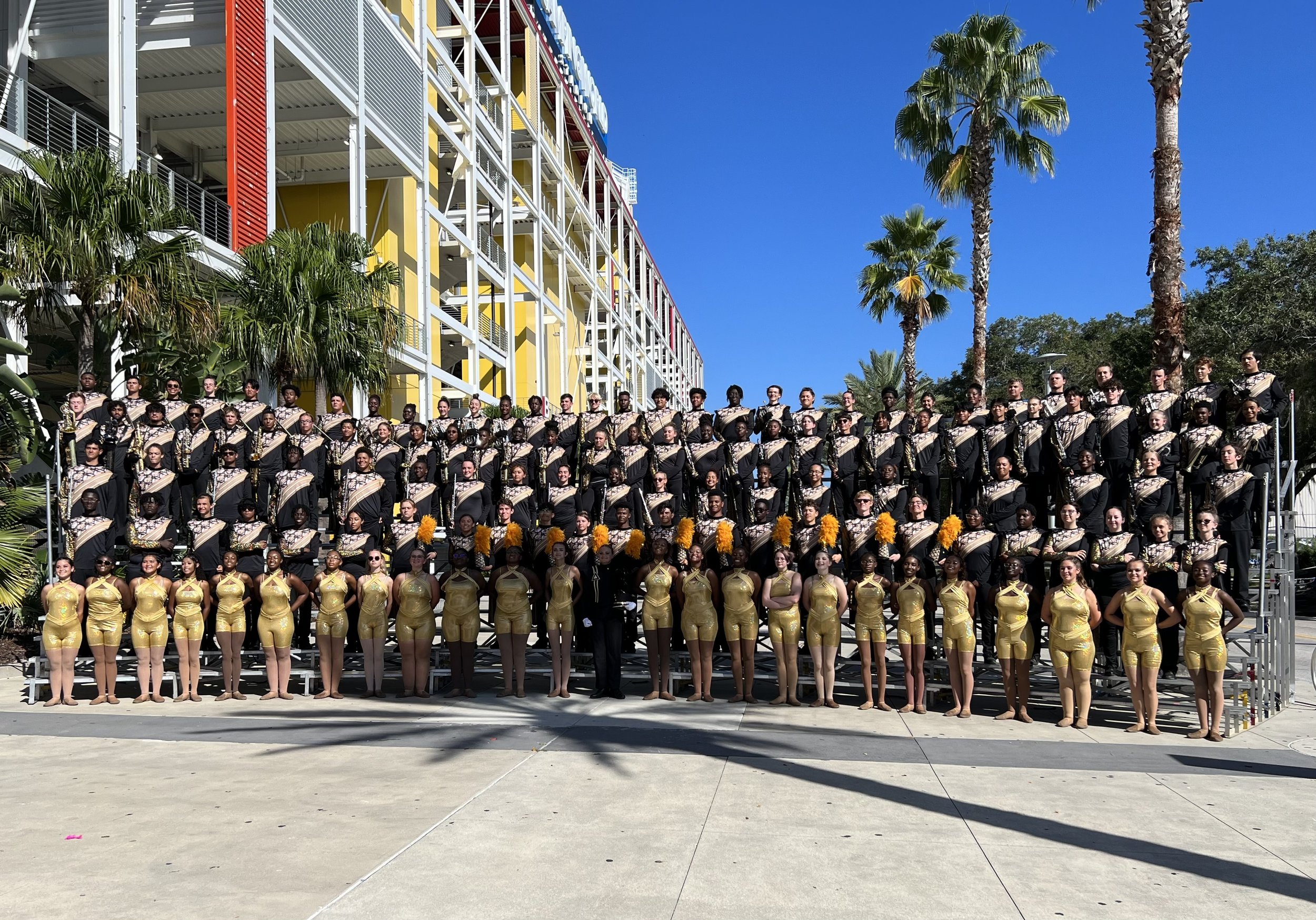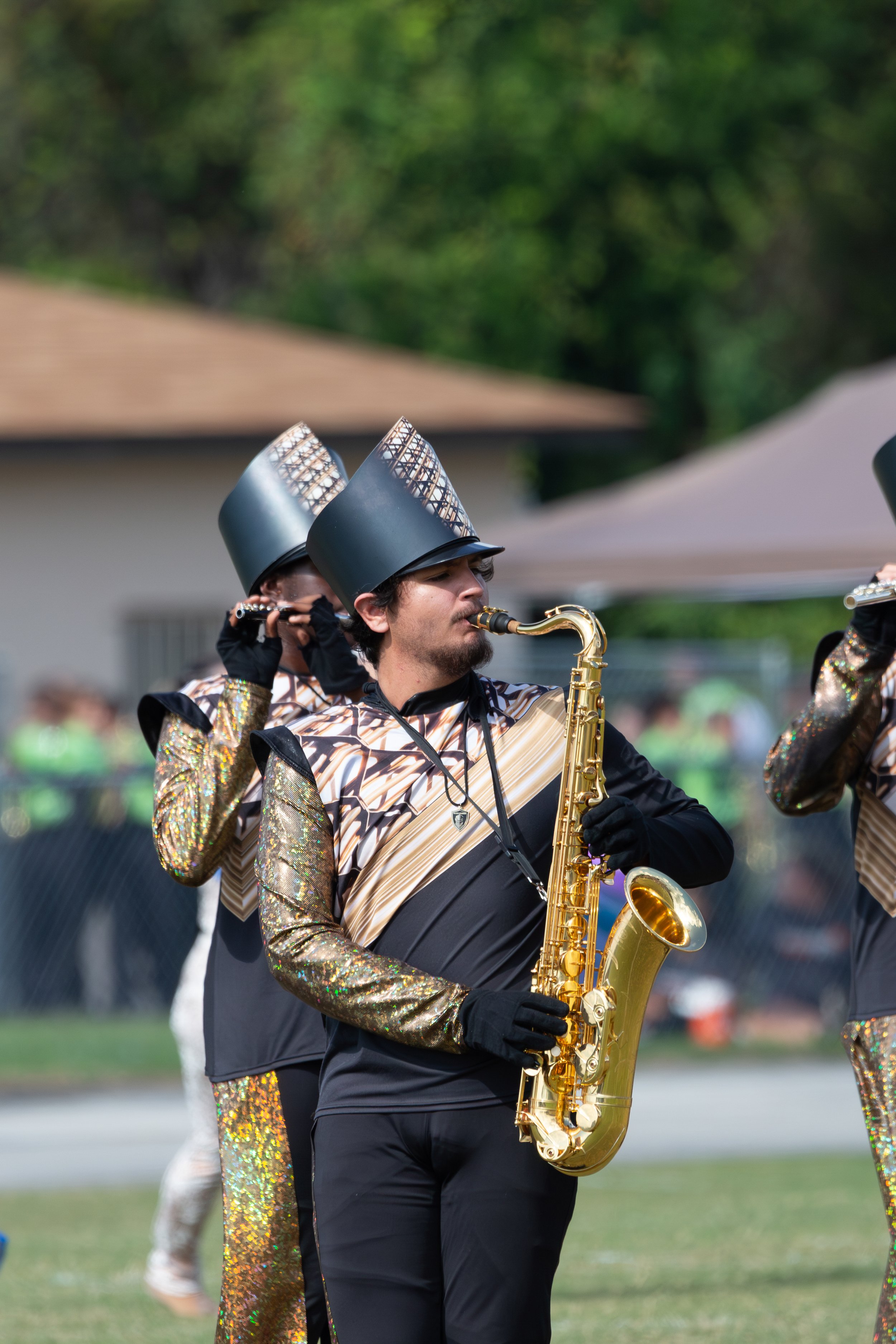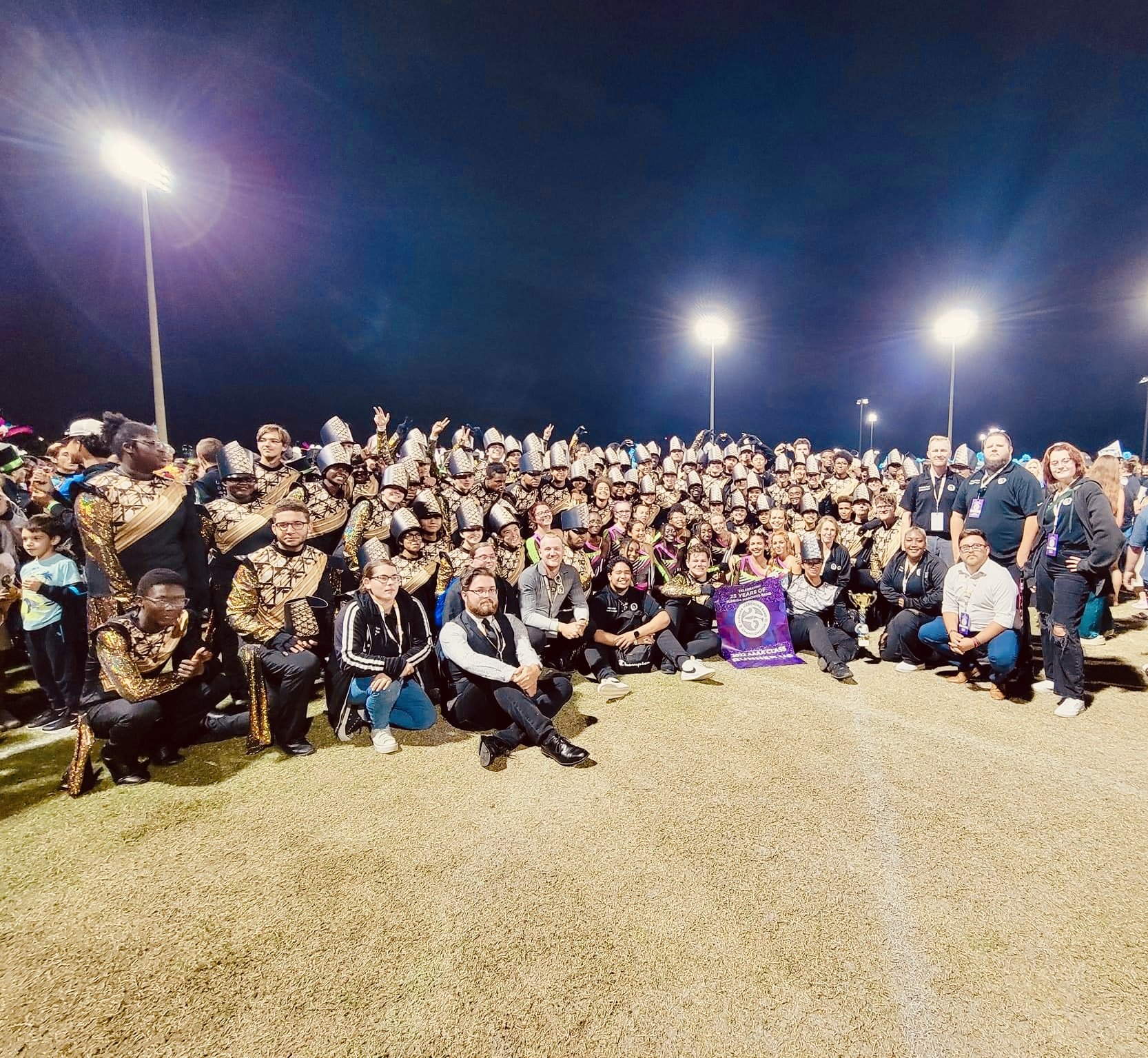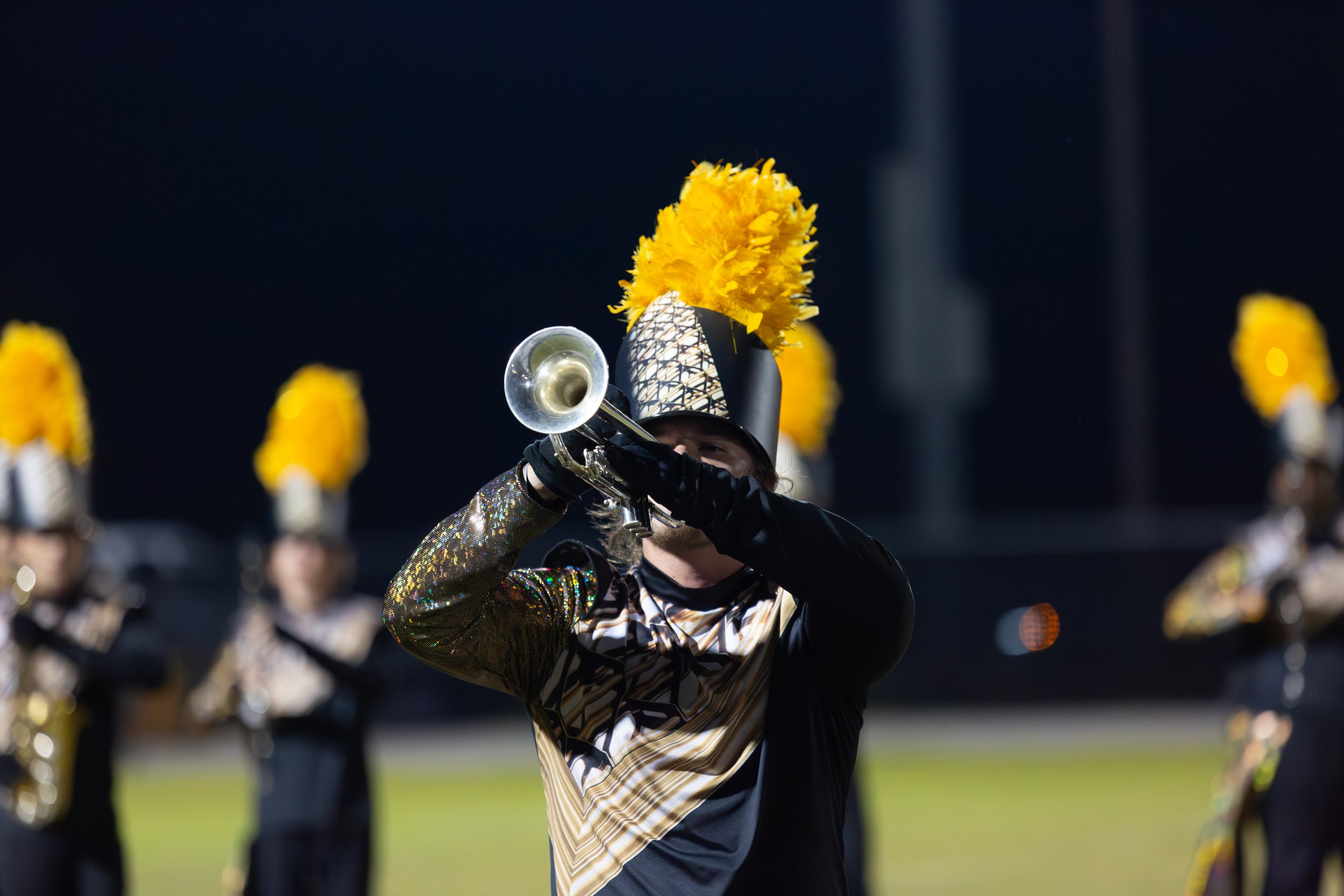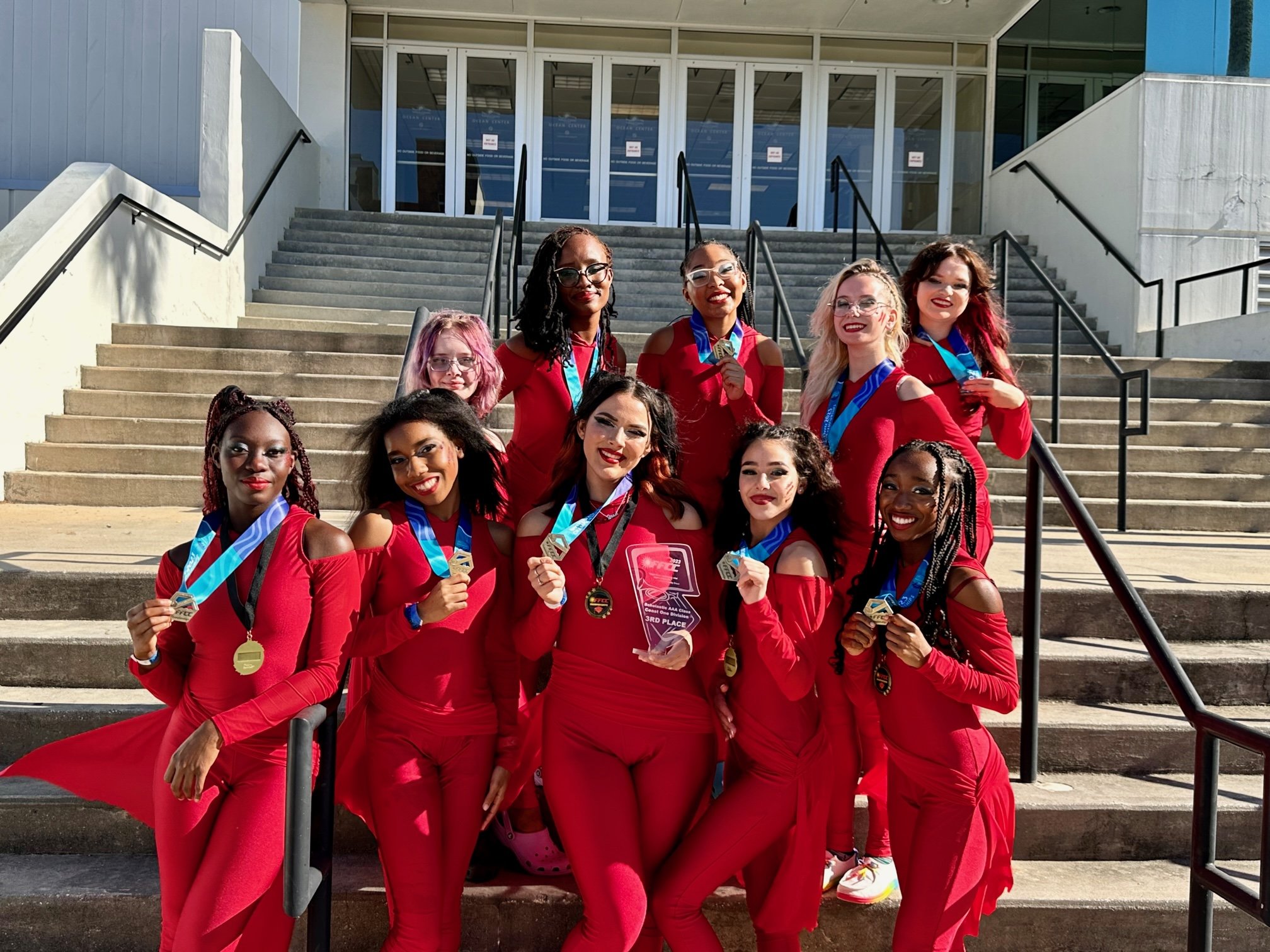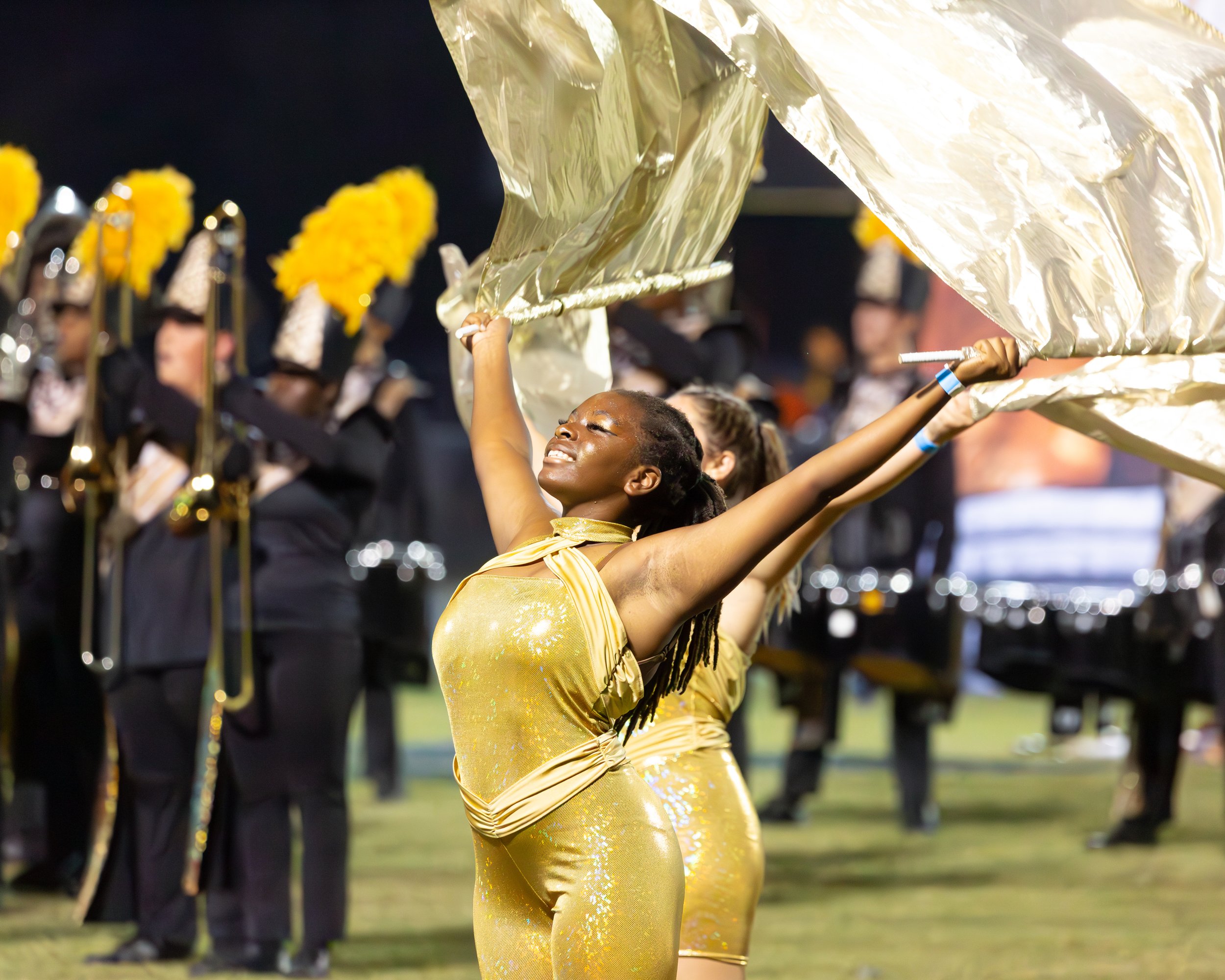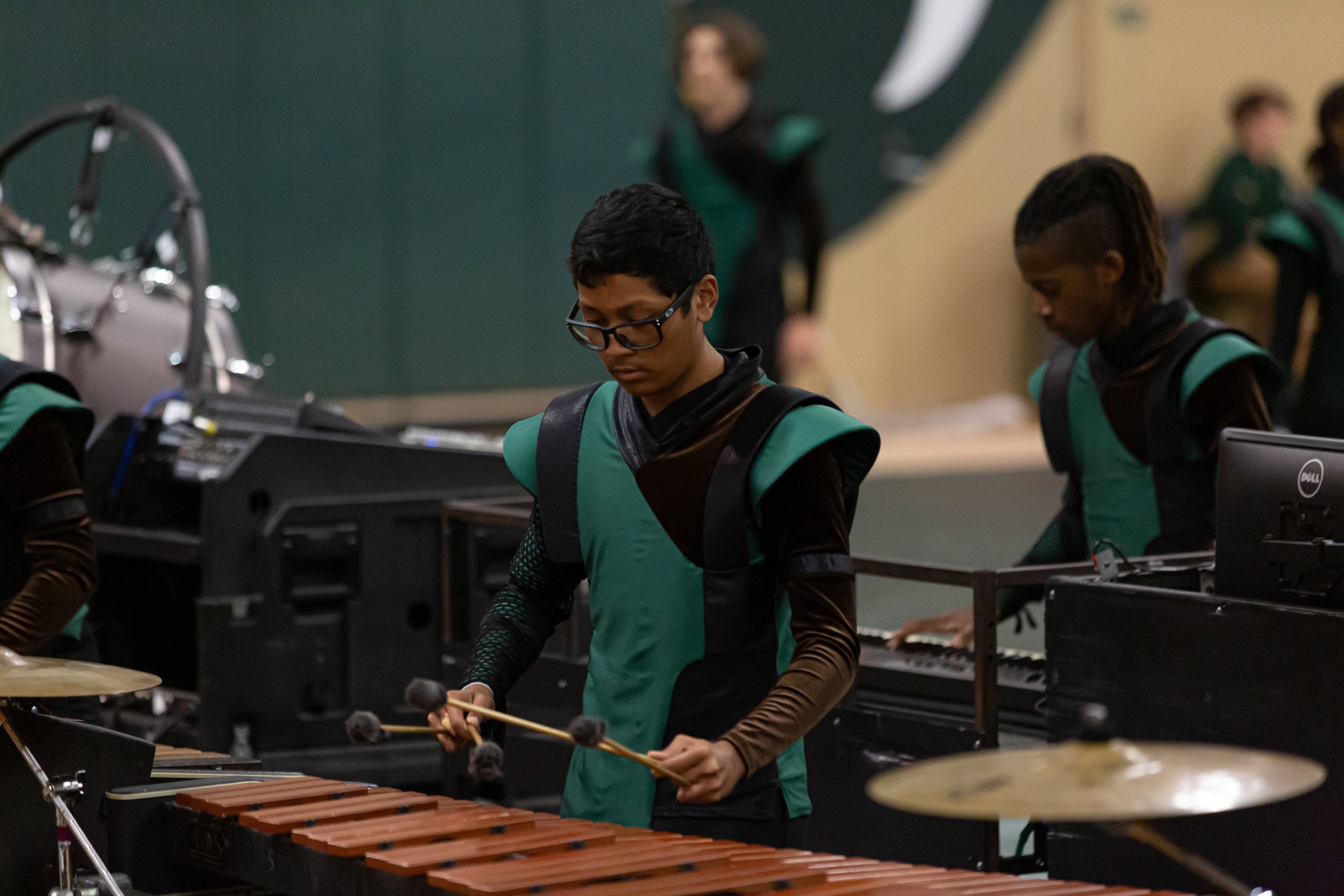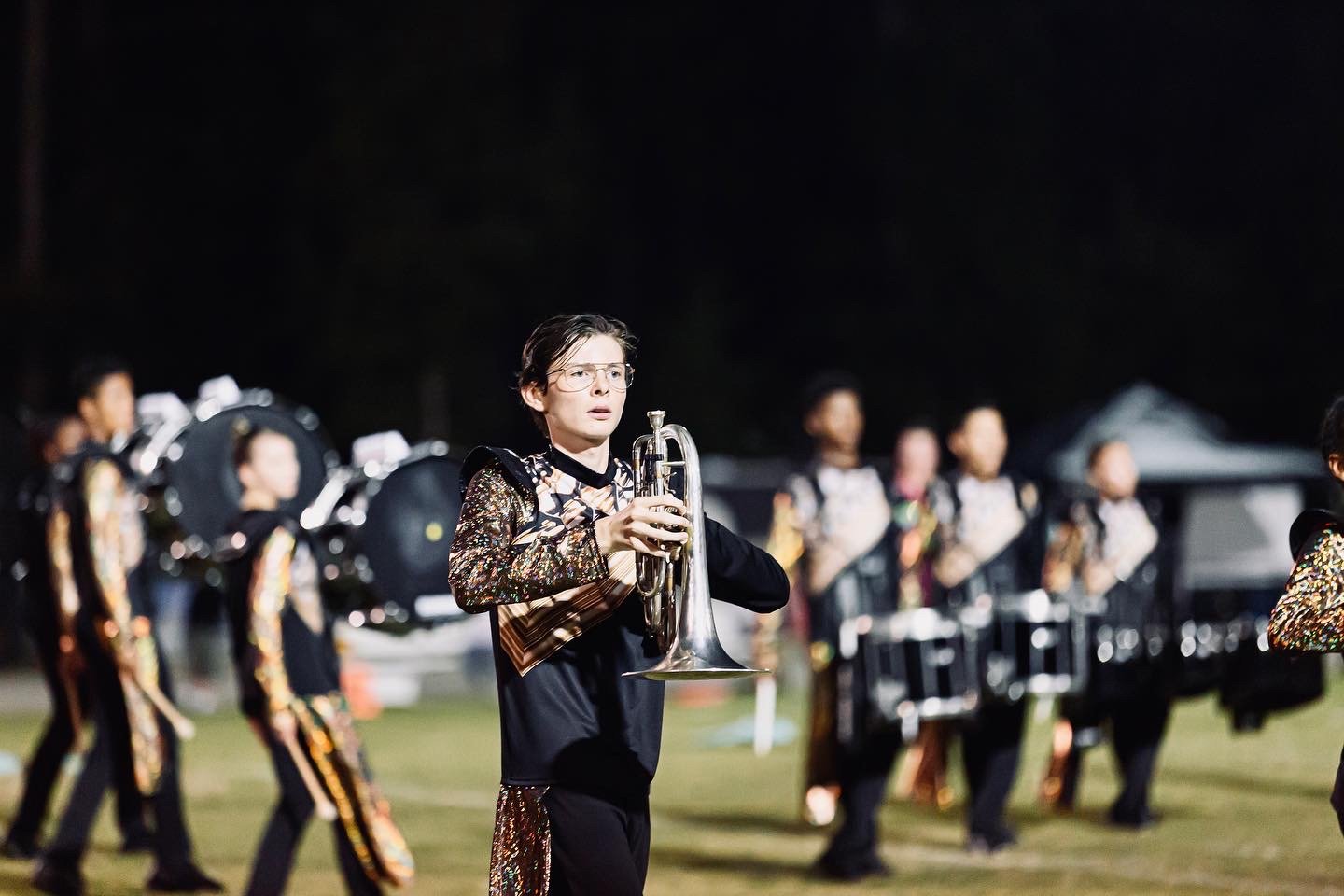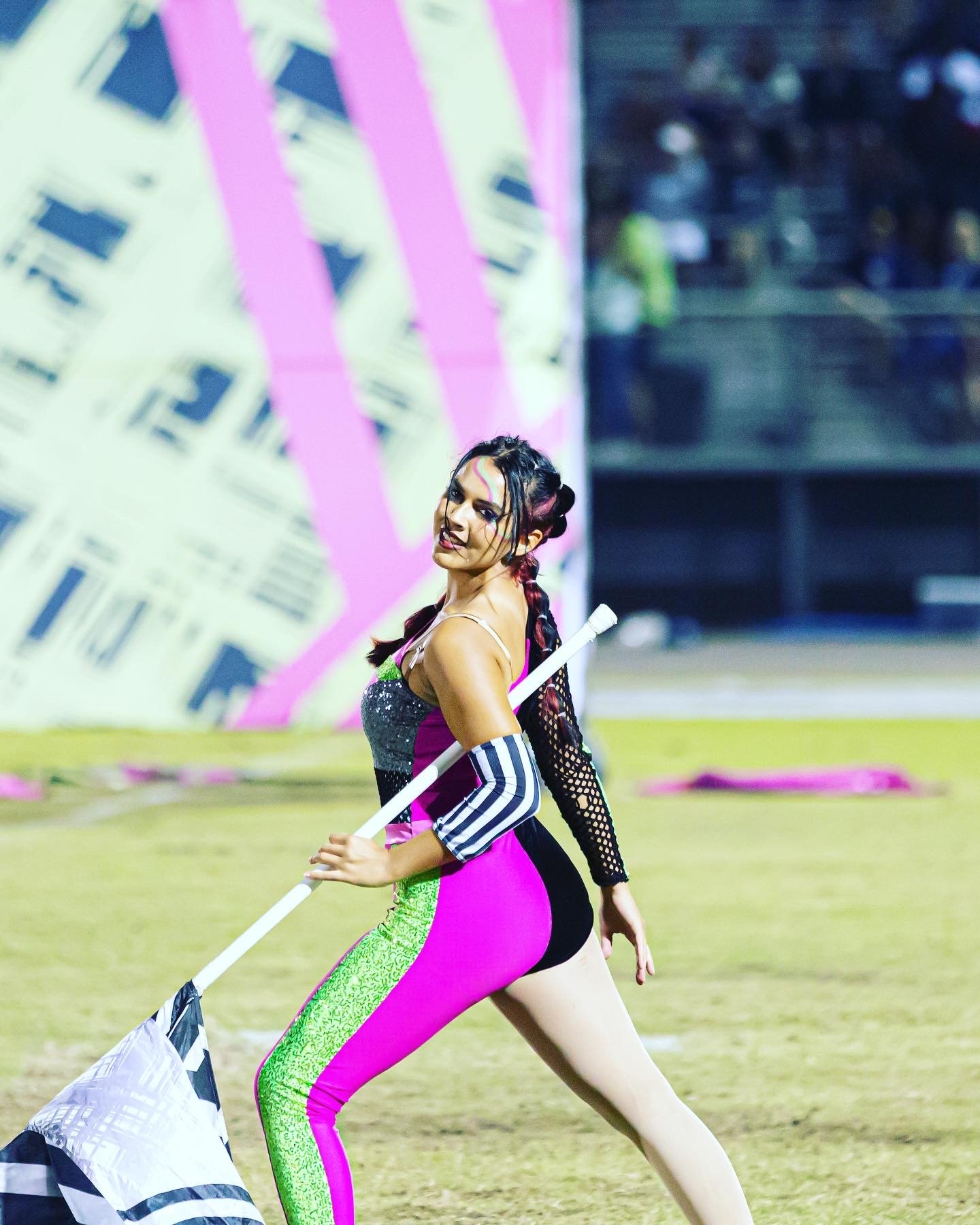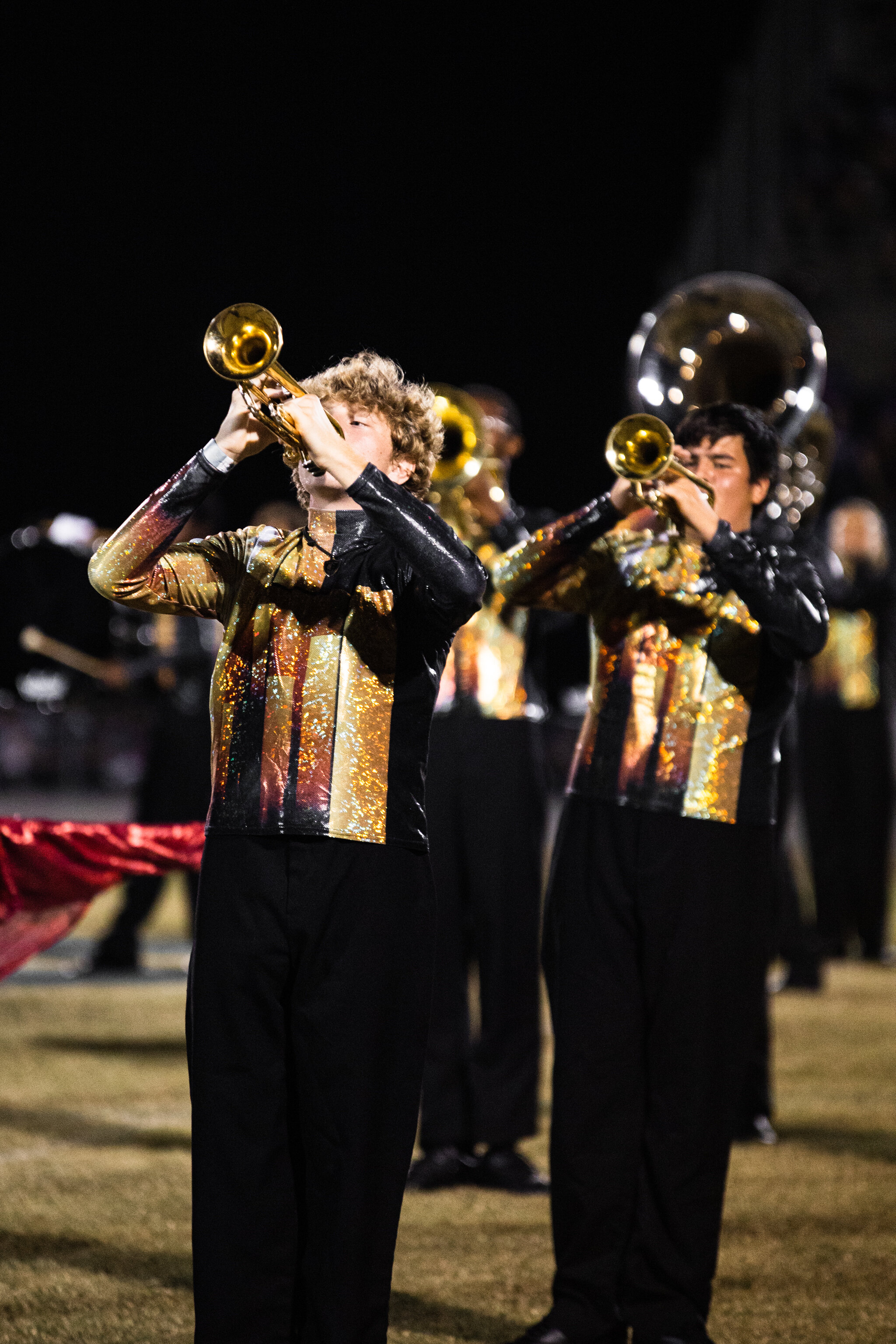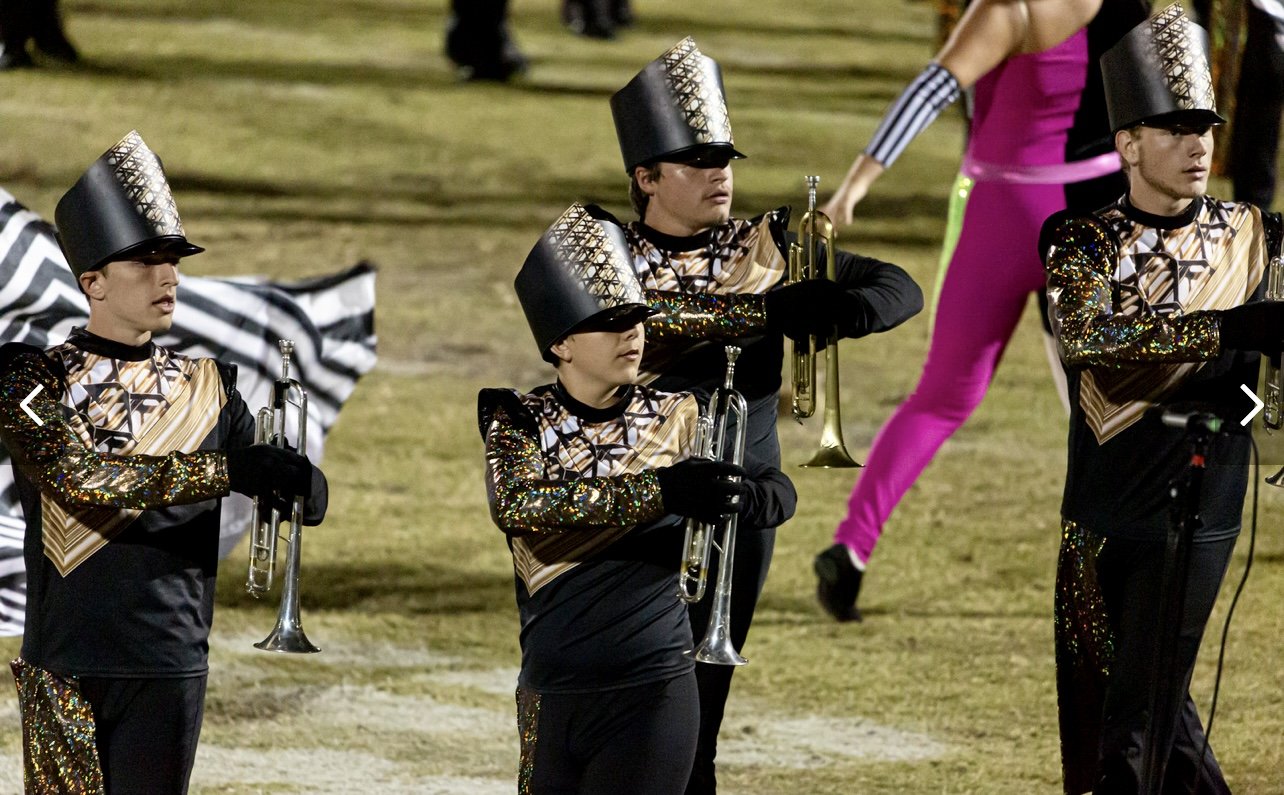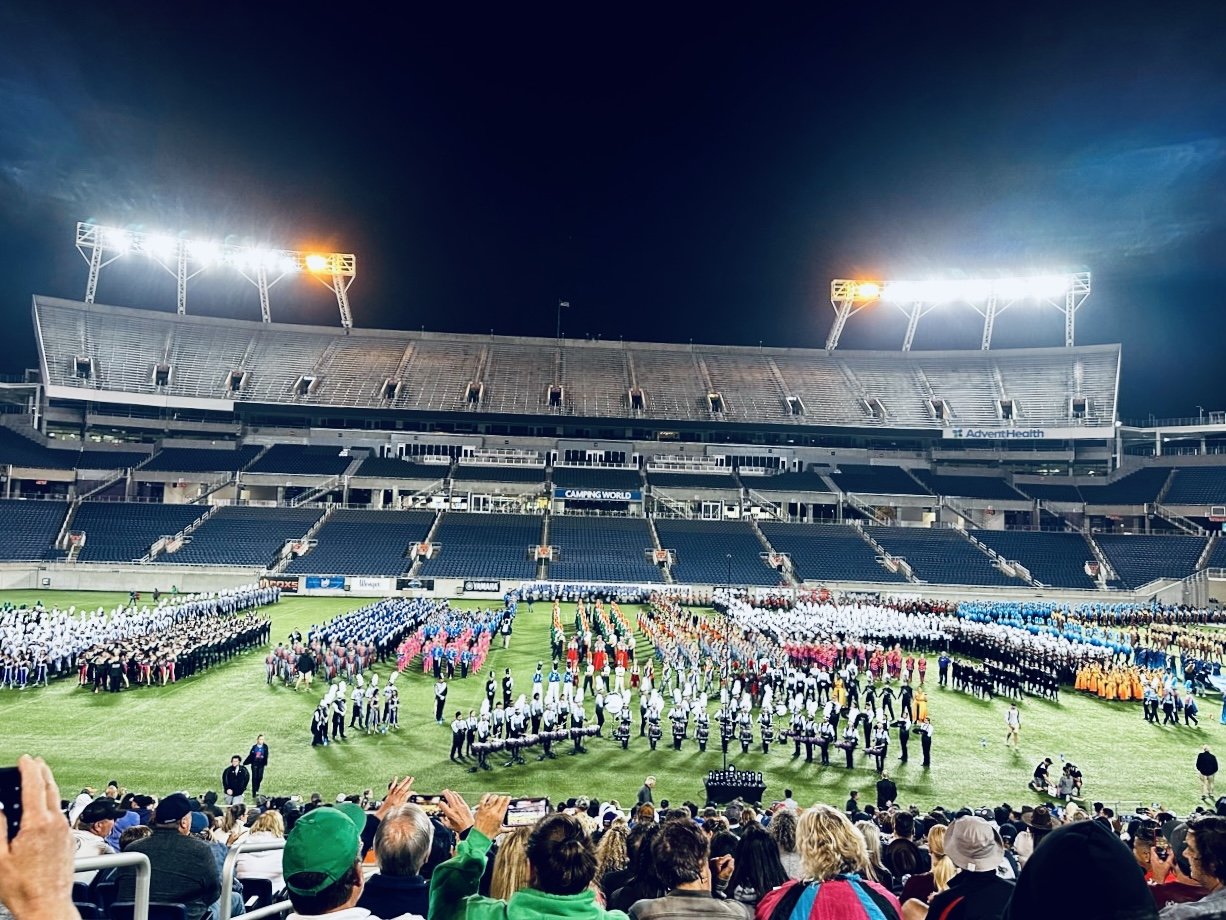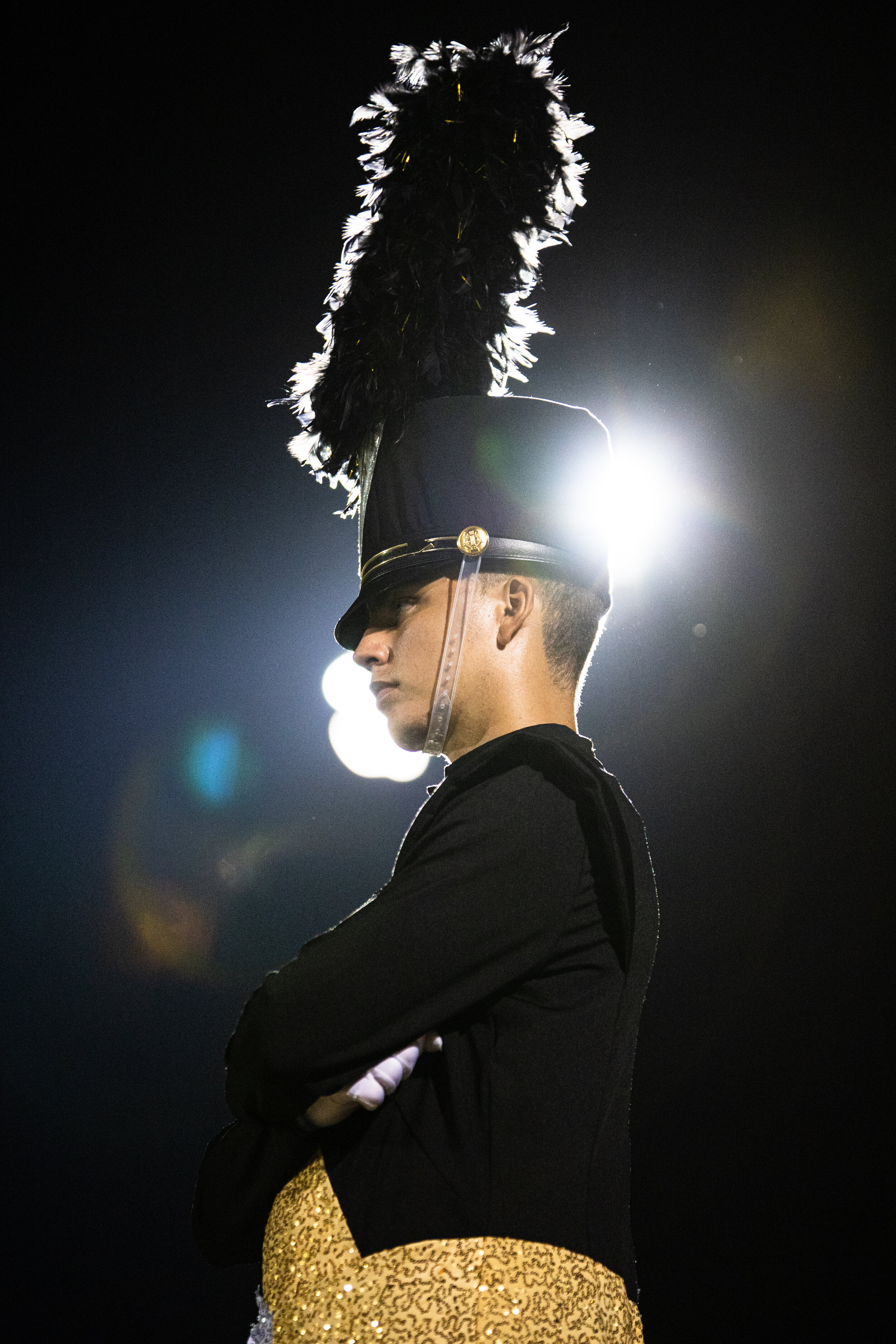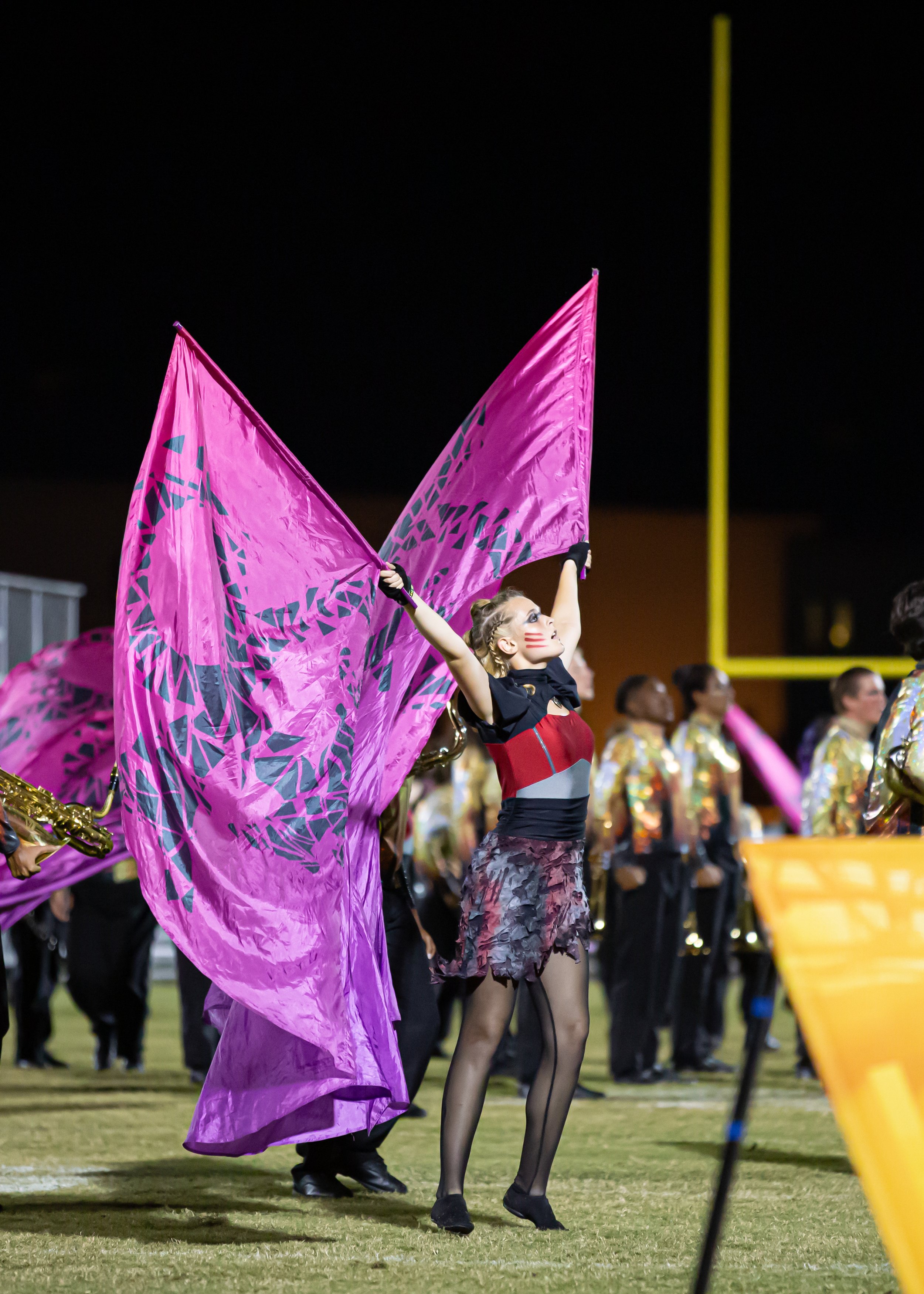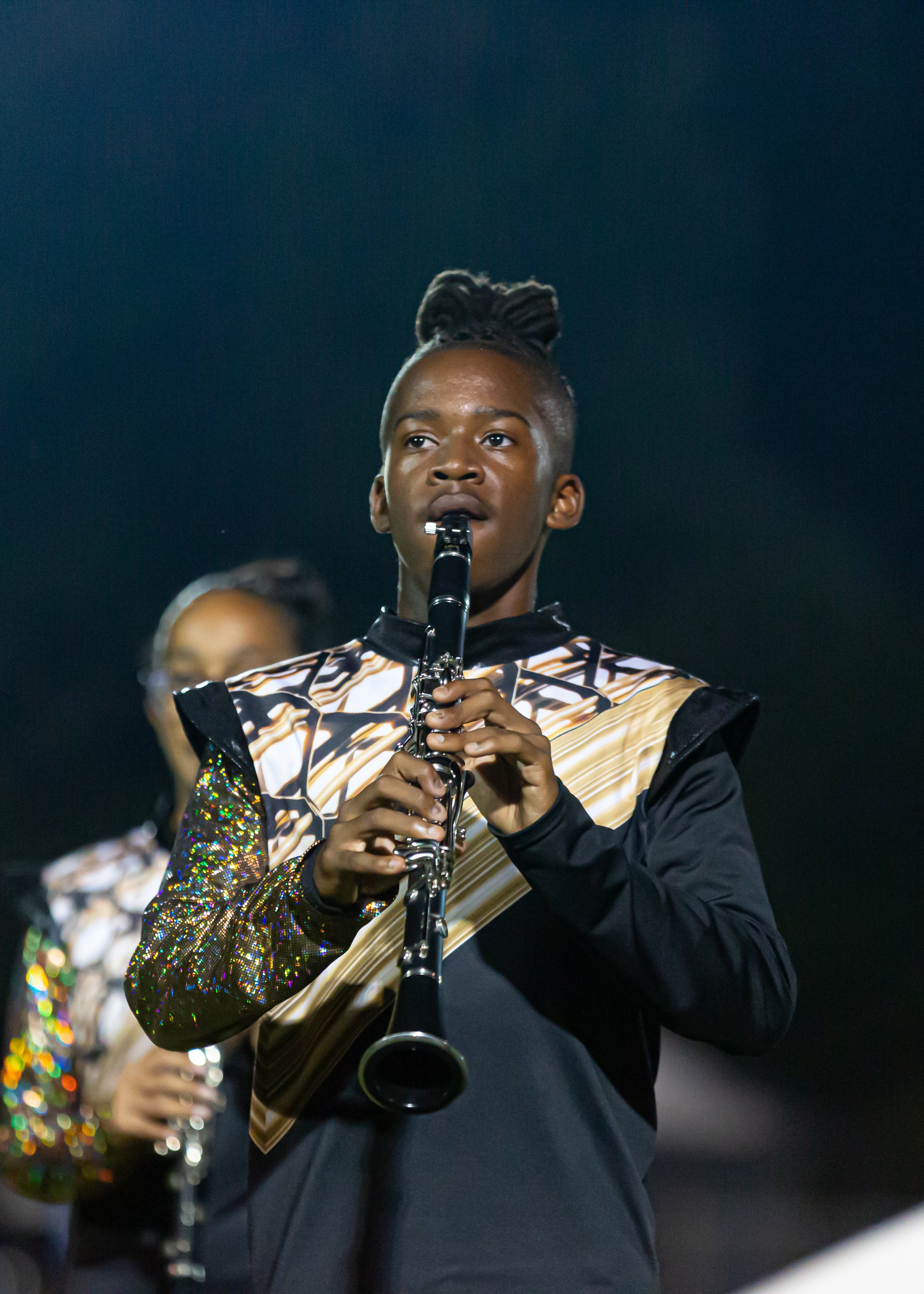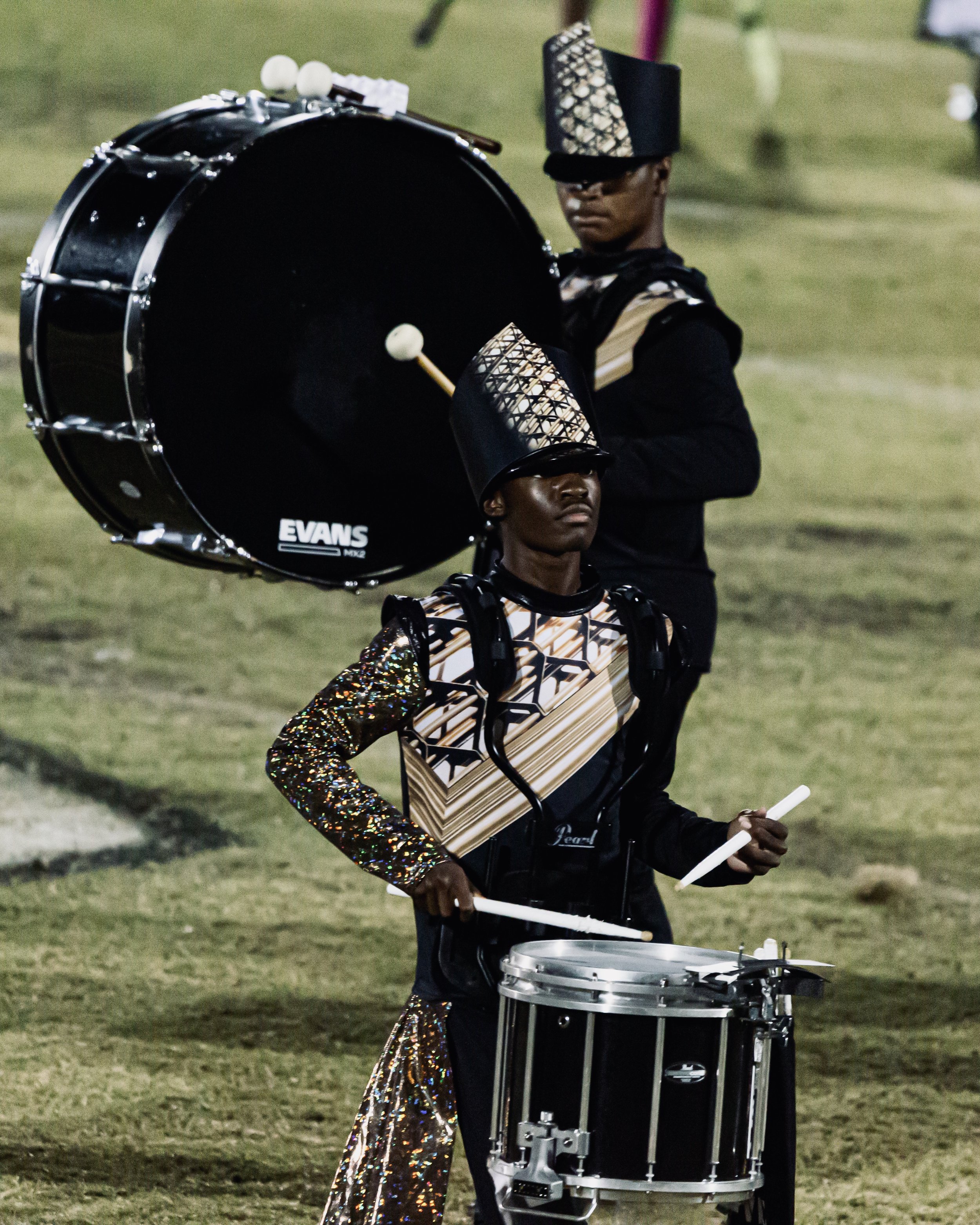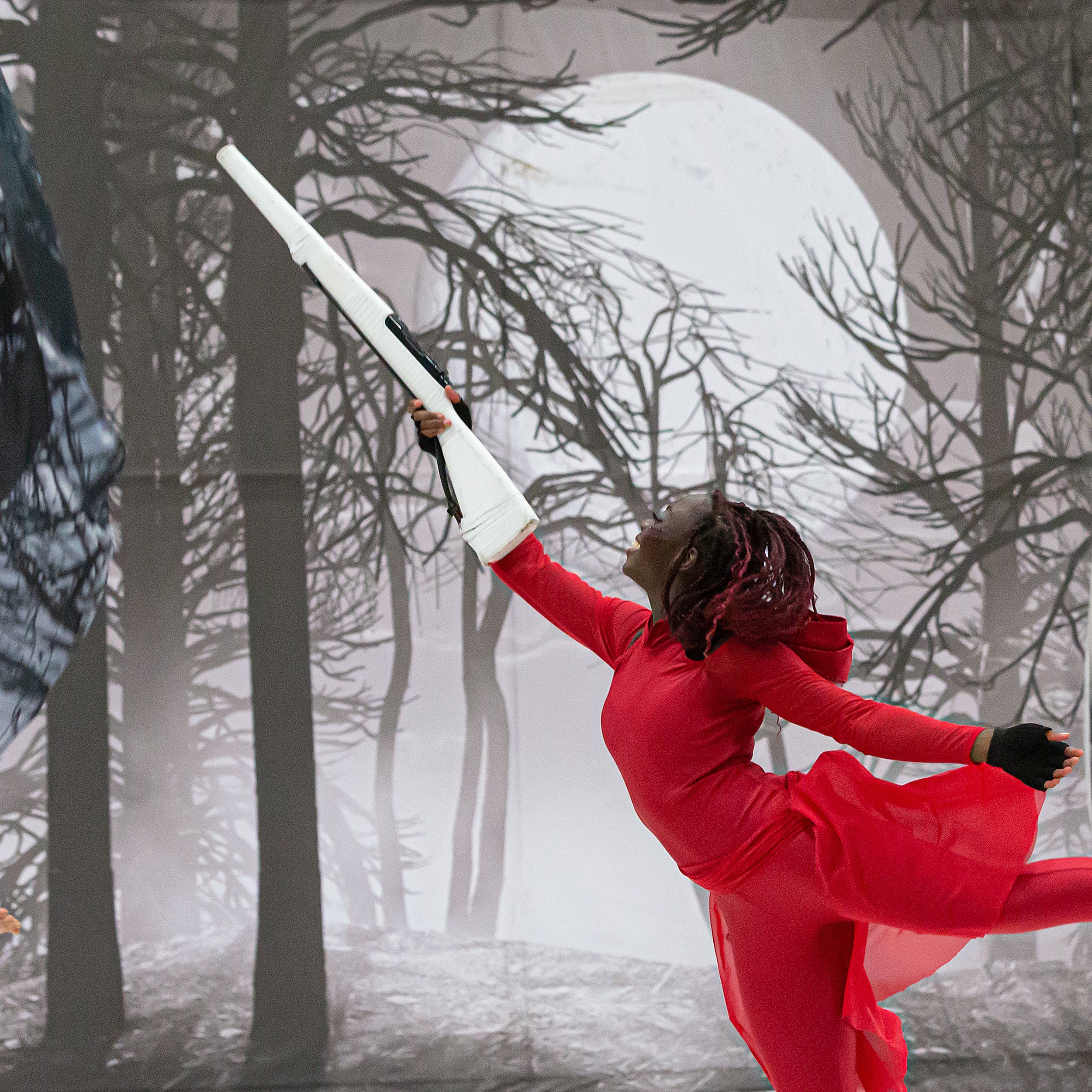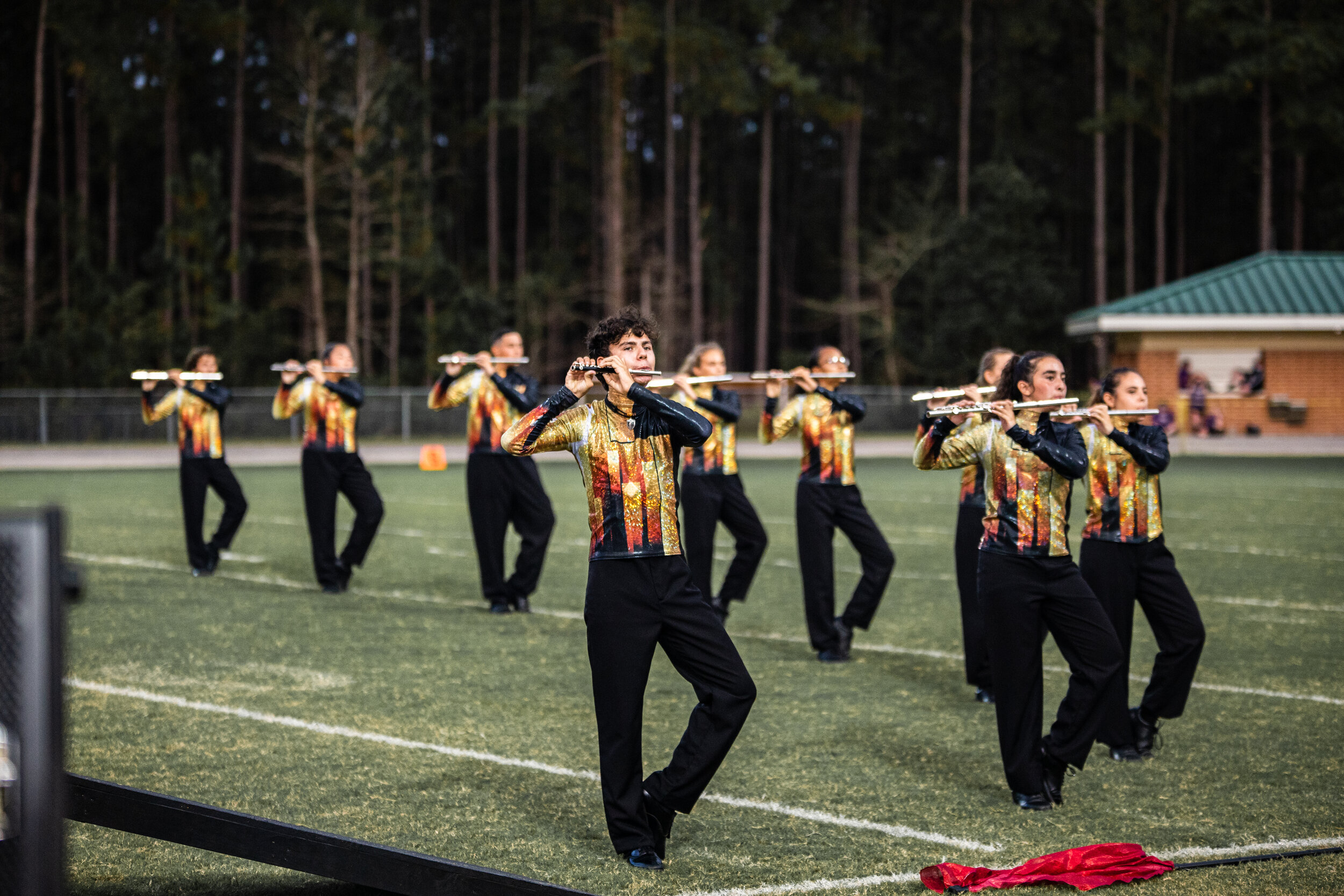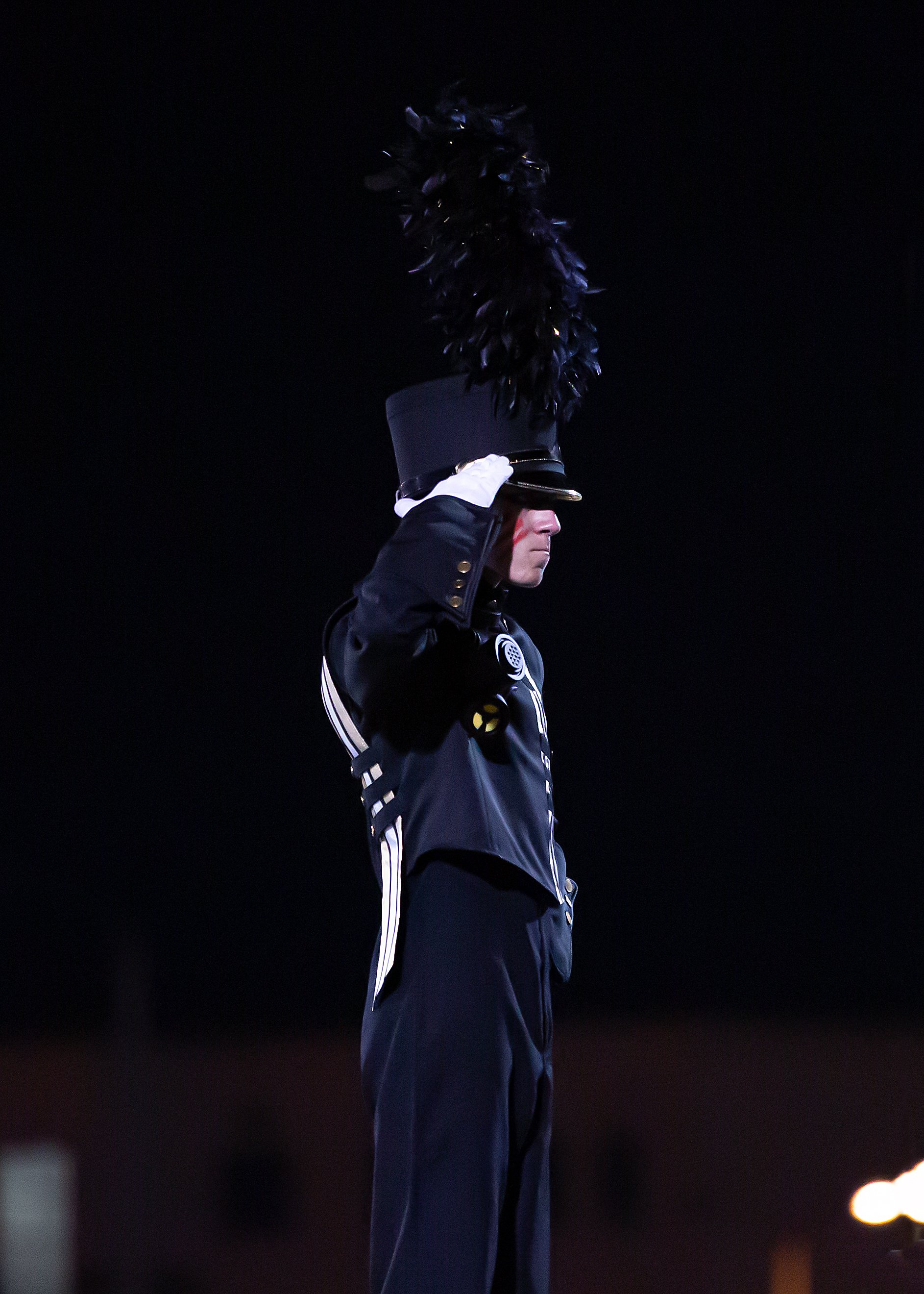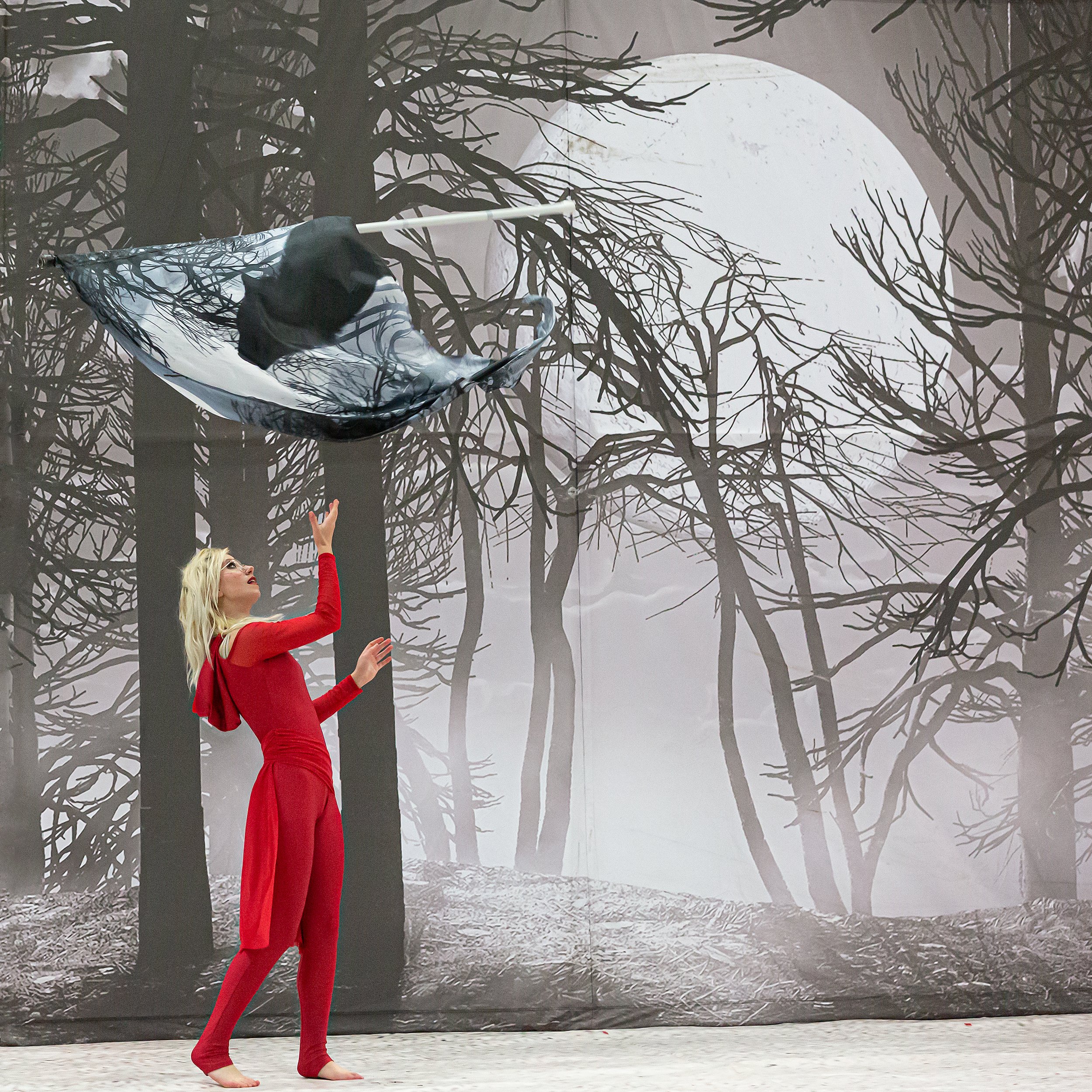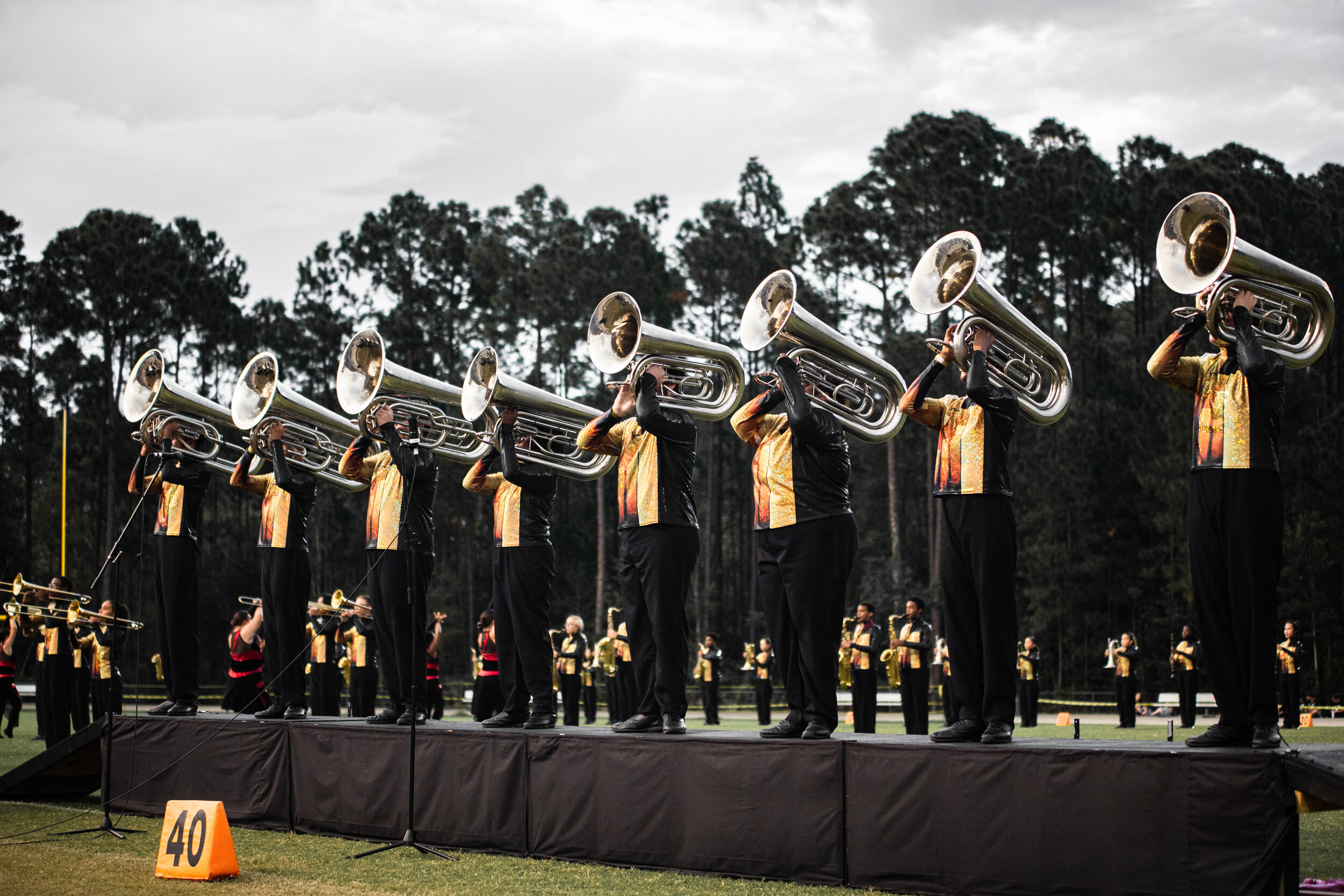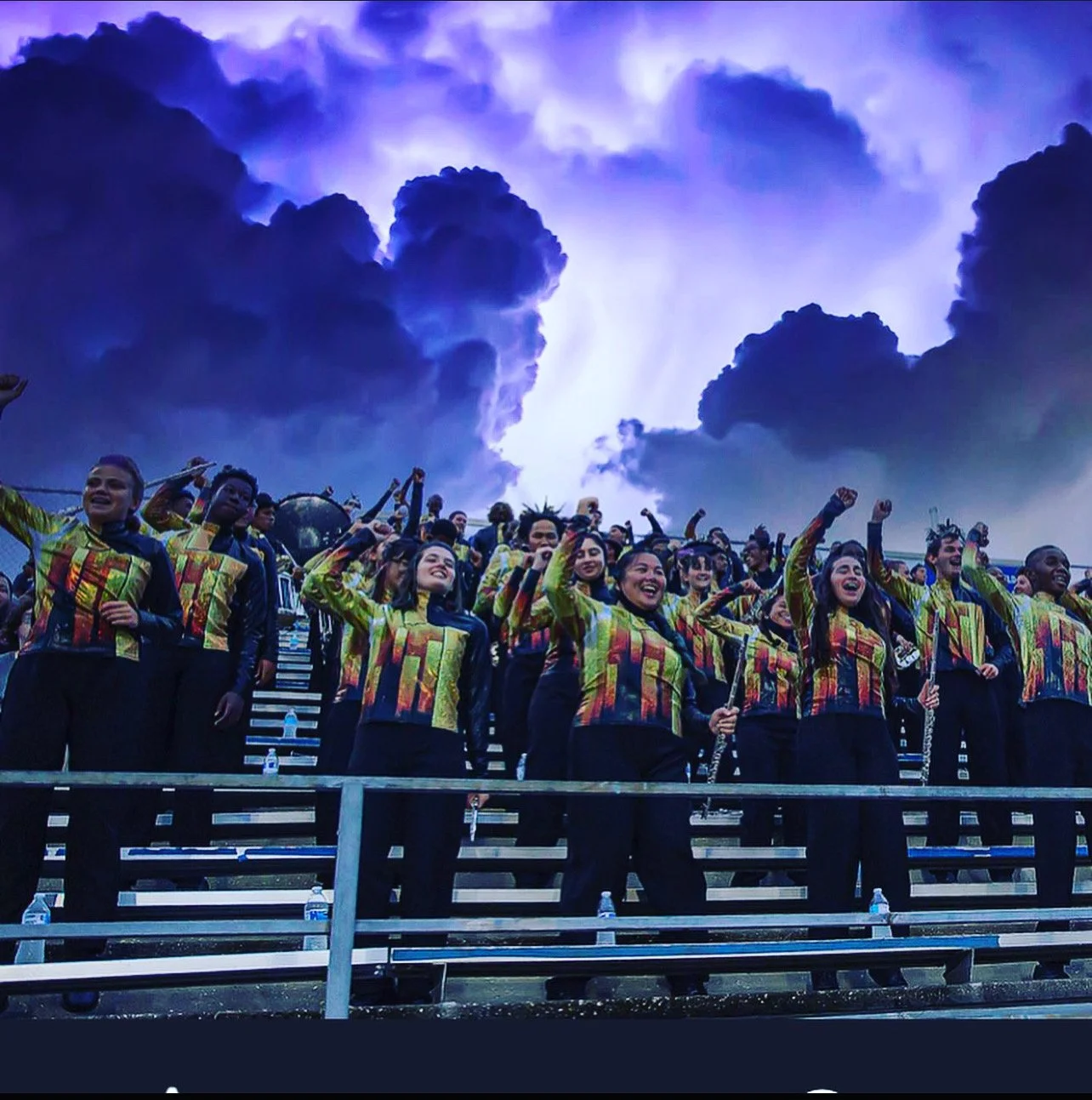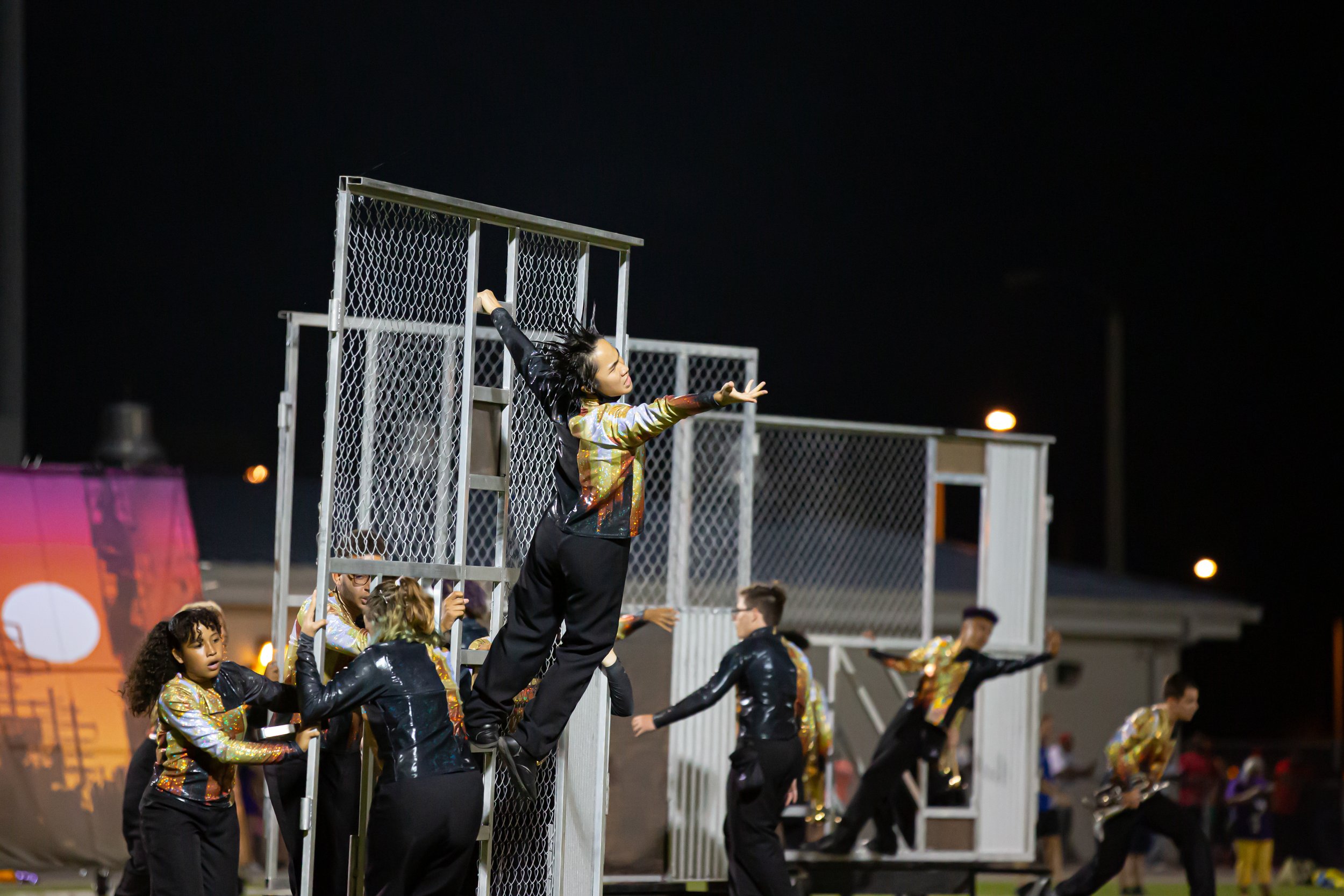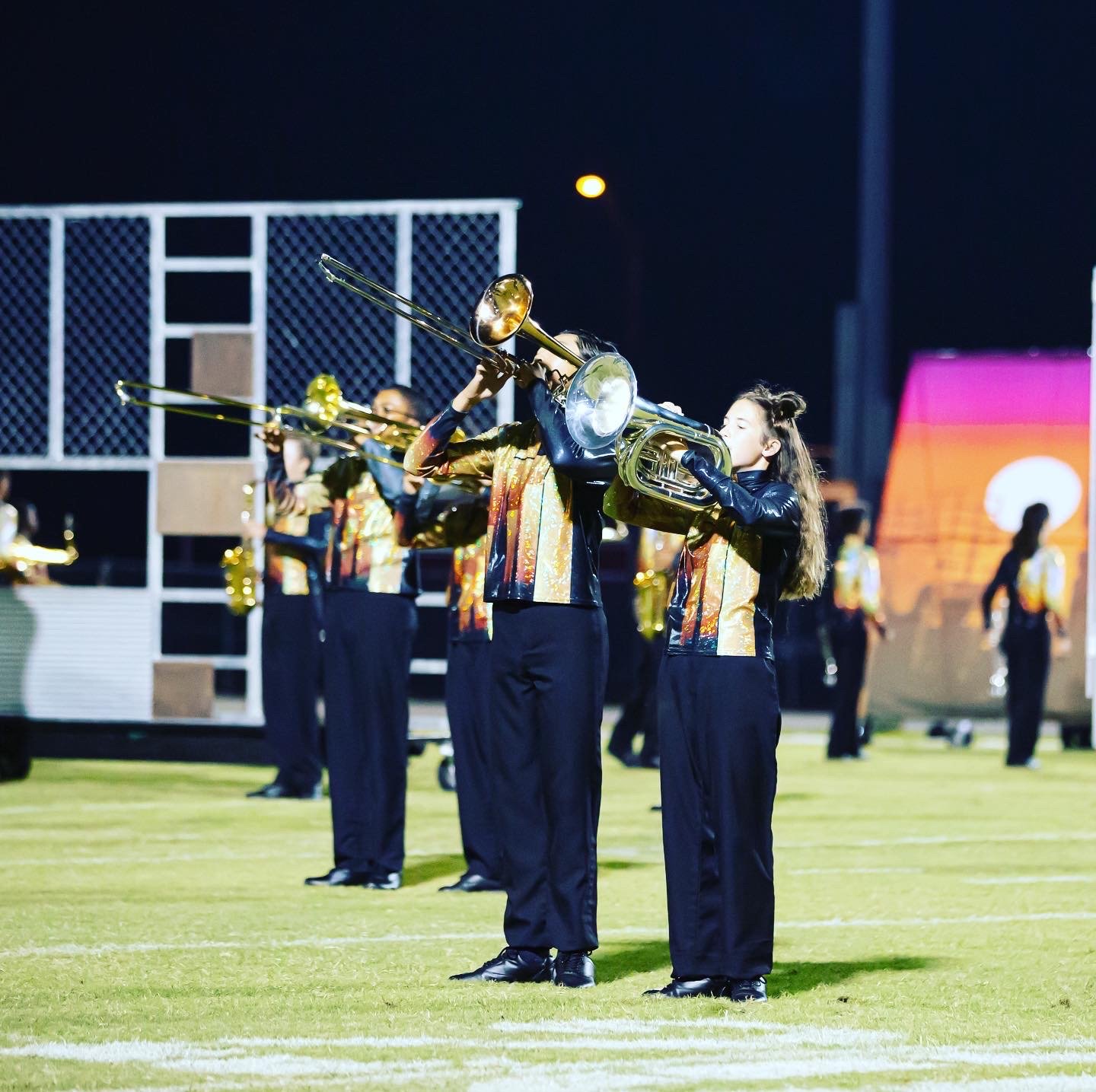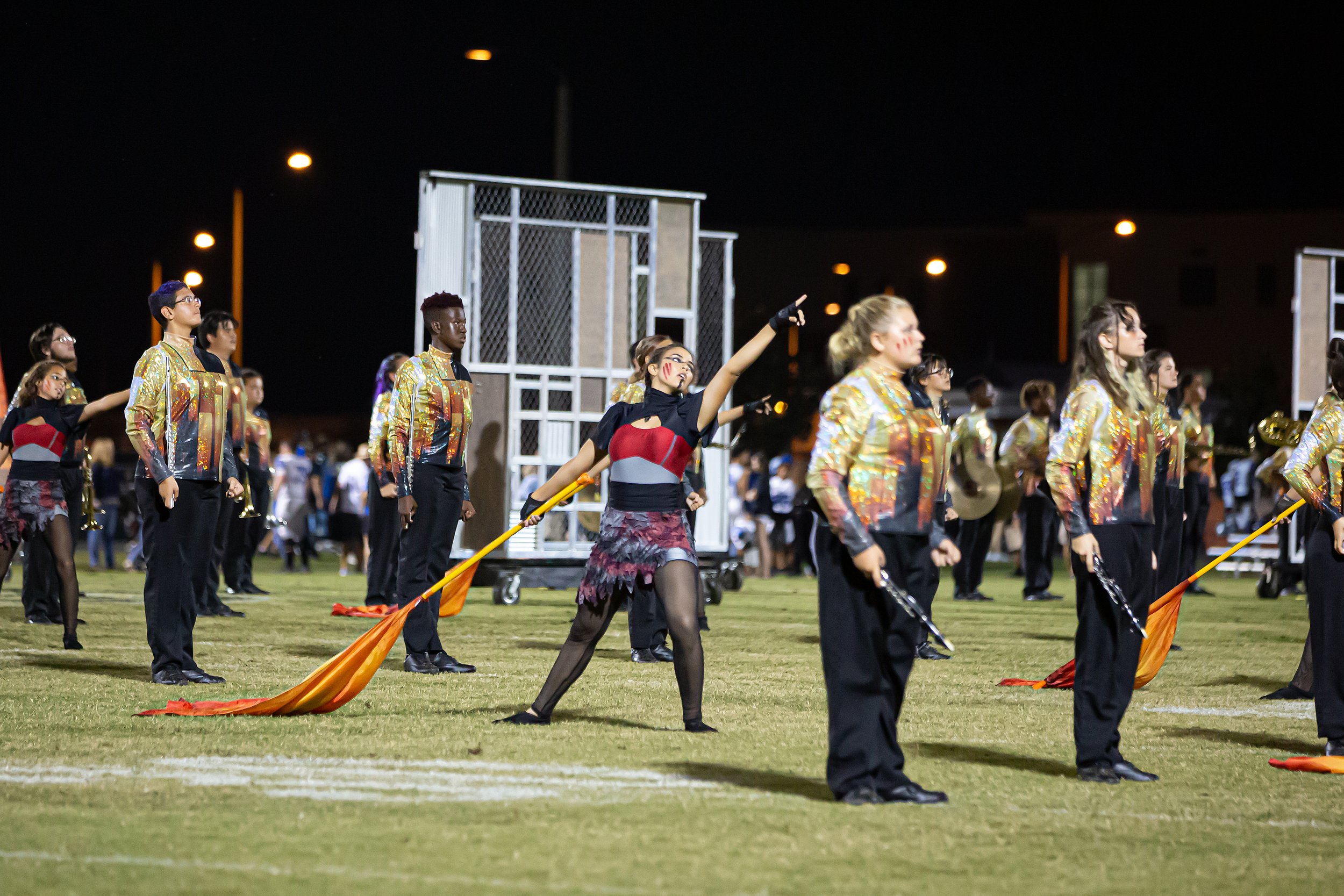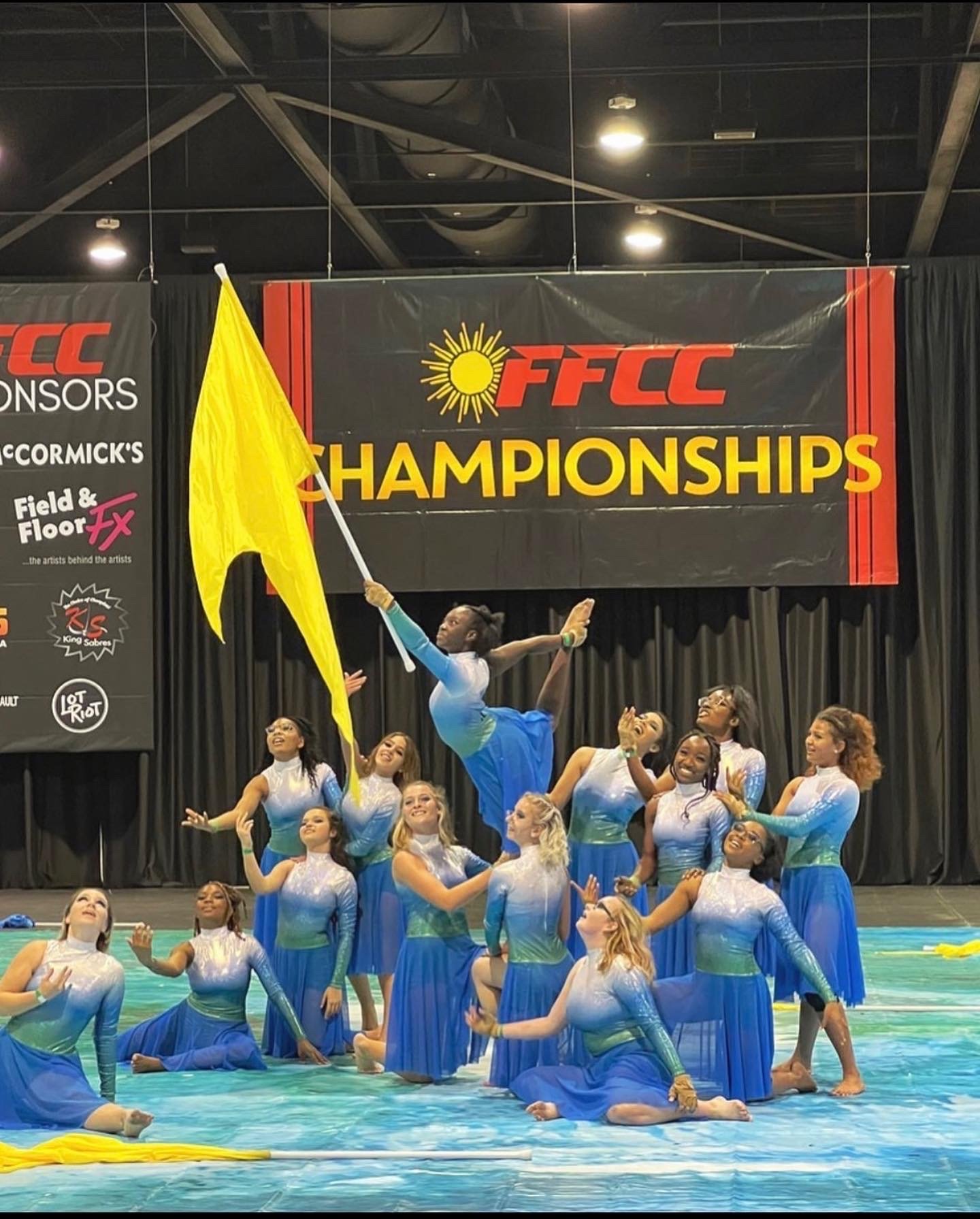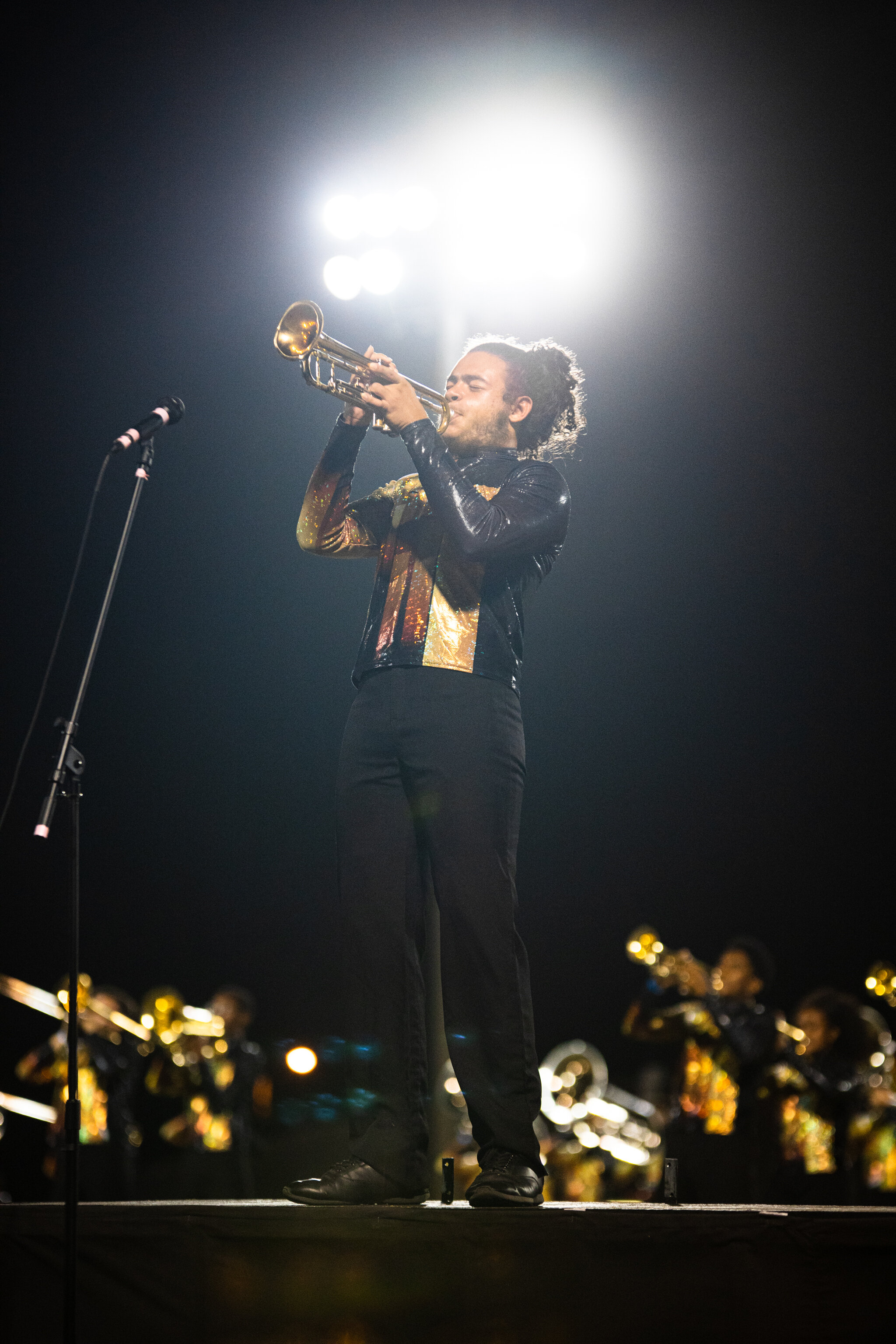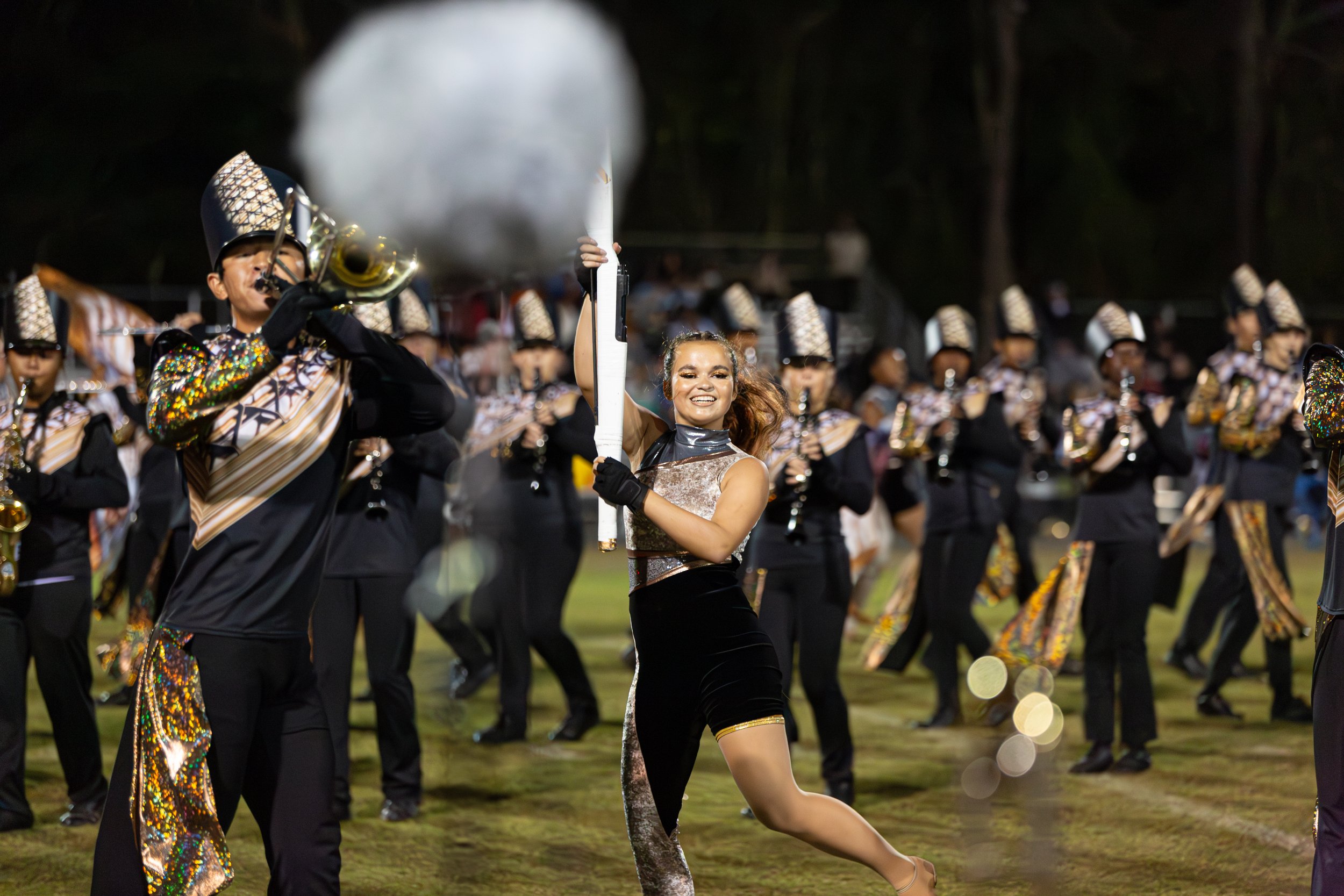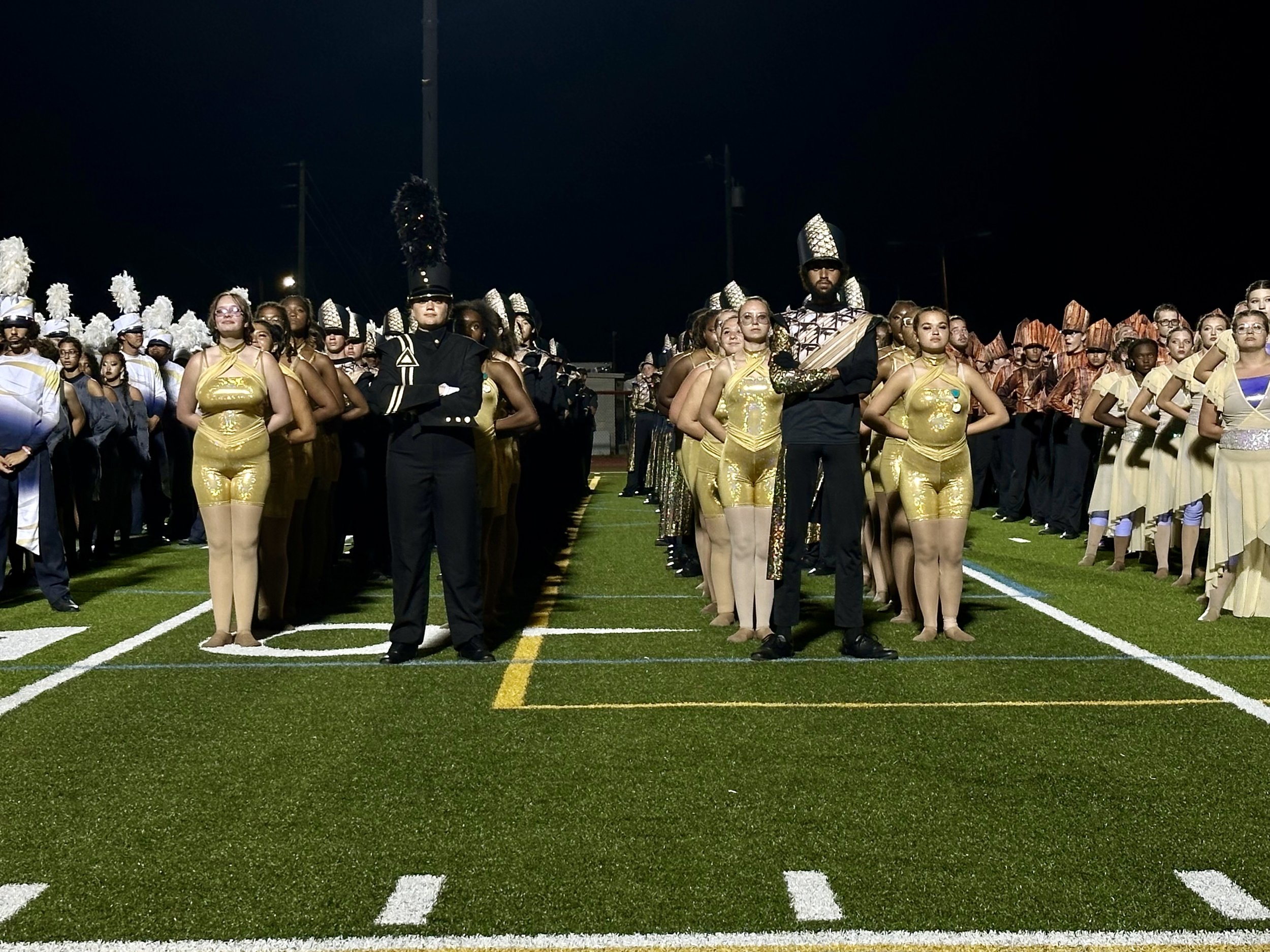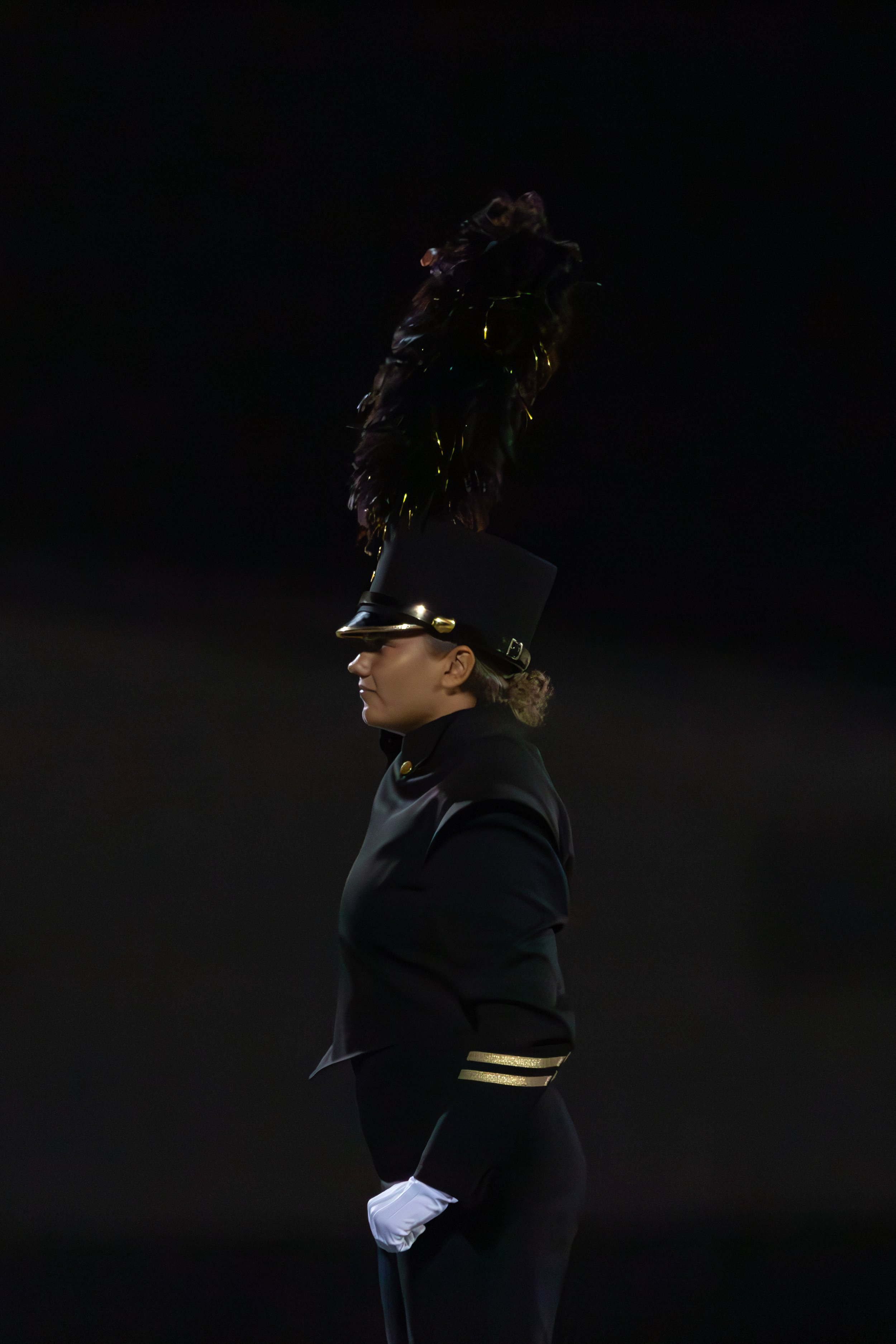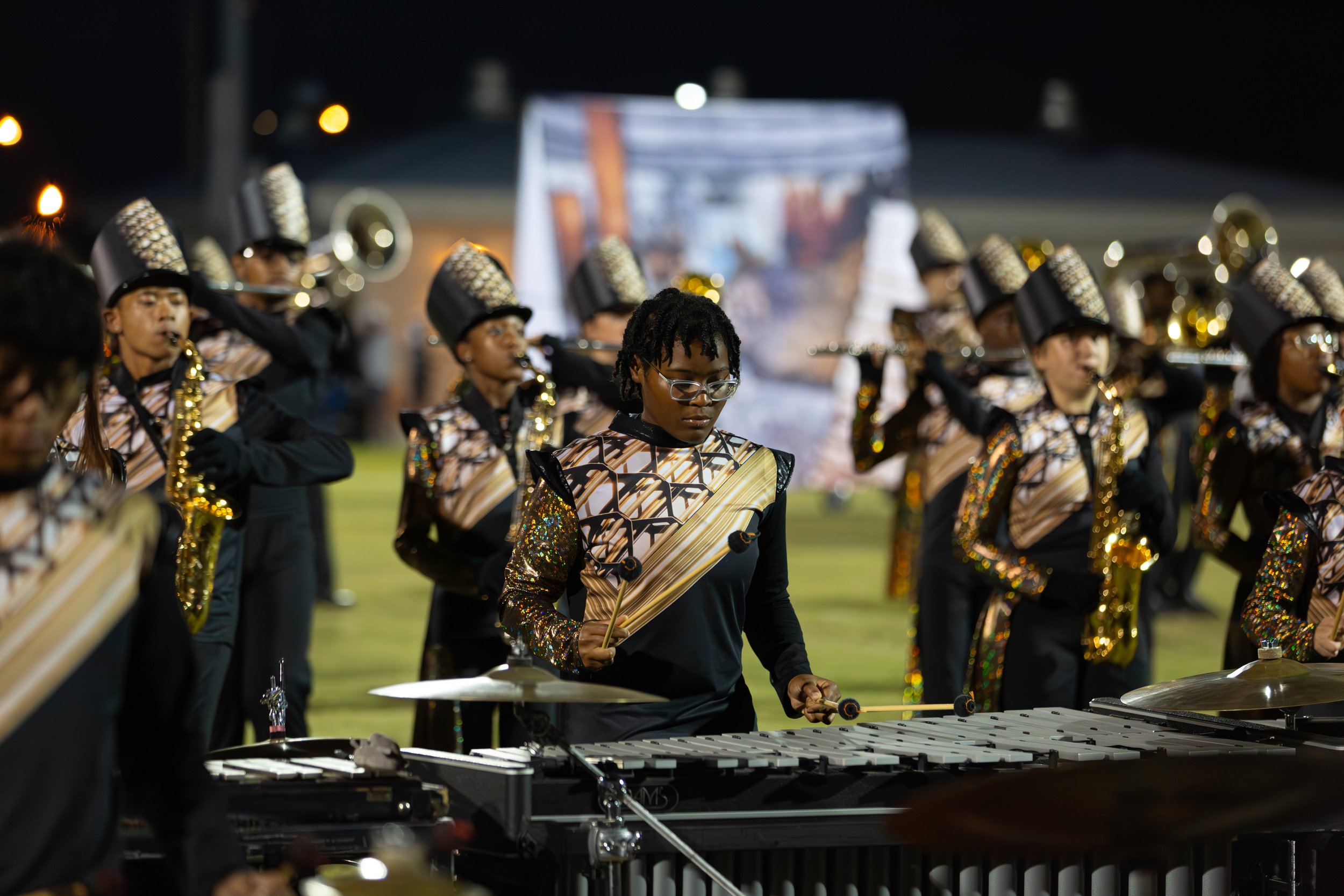The Golden Regiment
The Golden Regiment is the premiere performance ensemble at Oakleaf High School. All members must participate in the Golden Regiment in order to be eligible for Concert, Jazz, or Winter Ensembles. The Golden Regiment performs at all varsity football games, saturday competitions, parades, and community events. The ensemble traditionally travels to Tampa, FL to compete in the FMBC State Marching competition each season in mid-November. Students participate in camps at the end of May as well as Band Camp (mid-July until school begins) to prepare for each season. After school begins, the unit rehearses on Mondays, Tuesdays, and Thursdays during the school year with occasional Saturday rehearsals. All camp dates, rehearsals, competitions, and events will be on the calendar as soon as details are available. Typically, the calendar is in place before Summer begins. All camps, rehearsals, and events are mandatory - see Band Handbook for more details.
Frequently Asked Questions
What is band camp? Is it mandatory?
Band camp is our summer practice time that we use to get ready for the fall. Everyone is required to attend band camp. The dates/times are included in this packet. The benefits of the band camp are:
We get to know each other and become a “family” of friends working together to make an exciting musical and visual show.
We make new friends and get used to the school.
We learn basic concepts of good marching techniques and apply it to the show.
We learn basic concepts of good playing techniques, and how to play and march at the same time.
We have fun activities planned throughout the camp experience, where students will make lasting memories.
Why is band camp so long?
The hours for Band camp may seem long but they are necessary in order to learn the fall production. We begin our year with an activity that is both physically and mentally demanding; once the school year begins, it is very difficult to plan for success without having attendance at the camp. These dates also allow for a focused time absent of the inevitable issues of the school year (homework, testing, etc.). The daily schedule has been created to allow time for rest and re-hydration; we do our best to be indoors during the hottest times of the glorious Florida sun!
What equipment/supplies will they need?
Musical Supplies: Please refer to the Handbook for specifics, but they will need to have all of the basic oils, greases, cleaning cloths, etc. to keep their instrument in working order; reeded instruments will need a reed case of some sort and multiple reeds in rotation. For marching band, students will – each day – need a pencil, water, a towel (never hurts), their Dot Book (100 spiral bound note cards), Music Folders, sunscreen (camp), and a hat. Guard members will need their gloves and all necessary equipment (and rehearsal dress as requested by the instructor). All students should wear comfortable, school appropriate clothing that allows for freedom of movement. Acceptable clothing includes tennis shoes (yes, with socks), t-shirts, shorts (of appropriate length, sweats, and athletic pants. To camp or rehearsal, do not wear sandals, skate-boarding shoes, jeans, high-top sneakers, dress shoes, or any other clothing that restricts movement. Dress for the weather. Summer rehearsals will be inferno-esque, and rehearsals late in the marching season will be cool.
Do I have to have a physical on file in order to participate?
Yes. OHS offers a day where all students can get a free physical completed. This will take place on one of the evenings that registration occurs for ALL band students.
Do I have to be in marching band to be in band?
Yes. This is the only way to keep consistency throughout the program. Plus marching band is the perhaps, one of the most exciting elements of being a part of a high school band program. Extenuating circumstances will be dealt with on an individual basis.
Is marching band a lot of work? What kind of time commitment am I getting into?
The short answer is yes; band—specifically marching band—is a lot of work. However, it is well worth the effort. We practice 2 days a week in the evening. We have around 200 students currently in the band program, that have been managing/enjoying their experience. Though the hours are long and the work is hard, we have a tremendous amount of fun as we as learn, grow and develop as musicians.
What if my child says they want to quit or not join because of Marching Band?
This is not very common for us, but once in a while we’ll have a student who gets overwhelmed with actually DOING the work and going through the process; it becomes a lesson in perseverance. The sense of accomplishment they will feel in October and November is a hard thing to explain to one who has not experienced the activity first hand. Besides this sense of accomplishment, having pride in their Band and school, there are many life lessons to be learned here: perseverance, the value of honoring a commitment, teamwork, that work (period) is essential of life. These are life lessons that band is, seemingly and among many others, designed to teach. So, if your child is frustrated, please contact Mr. Robbins or Mr. Gugel and let’s work through to find out what the real issue may be; there is almost always a way to make them feel better about their participation.
Do I get graded for practice time/performances after school hours?
Yes. band is co-curricular. This means in addition to the curricular school day, students are graded on their participation at ALL band related functions.
Do I have to attend all of the football games, band competitions and concerts?
Yes. If there are conflicts, you need to reevaluate your participation in this program. It is mandatory that all students attend EVERY band related function (i.e. all football games, competitions and concerts).
It’s raining outside. Does that mean the band practice or performance is cancelled?
No. Rehearsals and performances are not cancelled unless there is an announcement made by the Directors. Students should be prepared to practice and perform outside in all types of weather. If the forecast is calling for inclement weather, bring a raincoat to rehearsal. For competitions, football games, and parades bring the appropriate cold weather gear to wear under the uniform. Never will we place students in danger of electrical storms or heavy rain, but we will inevitably have to operate in some light rain or cool weather at some point. In all cases, common sense will rule.
How many football games/competitions are there?
Usually about 10-11 football games (plus playoffs) and 3-4 competitions. The football games are on Fridays and competitions are Saturdays, beginning in October.
Does each student get a uniform? What do they wear underneath?
Each student will be issued the uniform of the Golden Regiment. Underneath each student should wear the issued band shirt, band shorts, tall black dress socks (to at least mid-calf), and the issued patent black band shoes.
What is the Golden Regiment’s responsibility during football games?
The marching band plays an important role in entertaining the crowd and cheering for our team. We perform a pre-game concert that includes the National Anthem, our fight song and potentially other crowd pleasers. We play pep tunes and cheer for our team during the game and perform our field show at halftime.
Halftime is over. Can my student leave the game now?
No. All students are expected to attend the entire game. We will dismiss from the Bandroom when all members, uniforms, and equipment have been checked-in. This will be our performance protocol year round for all ensembles.
Since the colorguard doesn’t play instruments, why do they have to be there?
The colorguard is an important part of our Golden Regiment family. Although they don’t play instruments in the stands, they can still participate by cheering for the team, provide ceremonial pageantry for pre-game and, of course, halftime. Also, the guard may sometimes use some of the game time for extra practice or to repair equipment, so that they don’t have to stay late after rehearsals. They also serve to help cheer our football team competing during each game. The guard is an important part of our band and therefore must be present whenever the Golden Regiment is out for any event!
Where does the marching band sit? Do the parents sit together?
Facing the field from the home stands, the marching band sits to the far left of the press box. Parents usually sit in a group beside the band. You can often identify them because they are wearing spirit wear. We hope parents will come to the games and enjoy socializing with each other, watching the game, and listening and cheering on, the band.
Do we need tickets for a marching band competition?
Marching Band members, staff, chaperones, and logistics crew get in free (up to a set number), but there is an admission fee of approximately $5-$25 for spectators. Tickets can be purchased at the gate.
What is a typical marching band show like?
Shows typically begin with the smallest bands and end with the largest bands divided by class; we will participate in many different circuits that divide classes differently. Each band has approximately 15 minutes to set up, perform and clean up the field. You may see judges walking around on the field during the show, watching and listening for particular elements. There are also judges in the announcer’s booth, who watch for the overall effect of the performance. The stadium will be filled with fans and the performing bands, while areas of the parking lots and athletic fields will be filled with bands warming up. It can be fun to walk around and listen to the groups warming up. It is also nice to support the other performers by watching them from the stands. It is a unique experience because when the bands perform, the stadium will be very quiet with outbursts of applause at appropriate times!
How do we get the best seats?
The best seats are as close to the 50 yard line and as high up in the stands as possible. Naturally, these are the first to go. If you want to have the best seats, arrive before the show begins and stake out your spot. (REMEMBER: If you opt to follow the buses, you will not arrive at the competition itself until after it has begun.) This is a great opportunity to see other Bands perform and support their hard work. There are some very talented marching Bands in our area, and it can be a real treat to see them perform.
Is there any special etiquette to being a Band fan?
Yes! Here are a few things to remember whether the performance is for marching or symphonic bands:
Please do not enter or exit the seating area while a band is performing. If you need to enter or exit, do so while the band is setting up their equipment or exiting the field (marching) or between pieces (symphonic).
Show your support by applauding and cheering all the students, regardless of school (@ competition). All of the students have worked hard and are excited to perform for an audience that appreciates what they do. Please refrain from making any disparaging remarks about other schools, students, or performances. (This seems obvious, but you’d be surprised how even the most well-intentioned people can get caught up in the heat of competition and make hurtful remarks!)
Noisemakers (ex. cowbells, shakers, airhorns, etc.)… just NO. They are more distraction than anything – we would rather hear your cheers! Cheering and applause are fine during a performance and may be especially appropriate after a solo or when the band achieves a particularly striking effect.
Please do not talk during performances. Turn cell phones to a silent setting or off. You would be upset if you missed your child’s performance because the people sitting nearby were chatting, answering cell phones, or otherwise making distracting noises. Please be respectful of others’ desire to see their child perform. Hopefully they will be respectful of you, too! Keep in mind that band is about putting forth your best performance. It is not about beating another Band, winning a trophy or getting a certain score. It’s OK to be excited if the band improves their score or wins a certain award; but ultimately, we hope the students feel a sense of accomplishment that comes from the heart, not from a trophy.
I see my child warming up in the parking lot. Is this a good time to say hello?
Sorry, but no. Students have very specific instructions about what to do when they arrive at a venue, and your arrival may put them into conflict with those instructions. The instructions themselves are put together to ensure their safety and security in transit and preparing to perform on “foreign” or even home turf; there will be little idle time. It puts the students in an awkward position if their instructor is telling them one thing and then their parent arrives and tells them to do something different. We ask that you respect the following guidelines:
Please do not try to talk to your child until after the performance unless you have a very serious situation that absolutely cannot wait. If this is the case, please approach the Director or staff person first so that they can help you to work through this situation with your child.
Don’t worry too much about finding your child after the performance. They usually have an uncanny ability to find you when they need money for the concession stand! If you sit with our fans – AKA the band parents, it will make it even easier for them to find you. You can also designate a particular meeting area, such as the concession stand, for after the performance.
Please do not interrupt the warm-up unless you have an emergency. The students (and staff) need to focus. If you have specific, non-emergency concerns and need to speak to Mr. Gaines or a staff member, this is not the best time. They would be happy to speak with you after the performance or arrange an alternate meeting.
The best thing you can do before the show is find a seat and cheer!
What happens at the end of an adjudicated performance?
After the last performance, the drum majors and selected members from each band will line up on the field. This is called “Retreat.” Scores and awards will be presented and students will return to the bus. Some shows have a “Full Retreat” where the entire band will take the field.
The bus just got back to school. Why can’t my child leave yet?
Students are responsible for turning in uniform parts, cleaning their stations, and unloading and properly storing all equipment, even if they do not personally use it. If we work together this process won’t take long and everyone can go home.
How are the Bands scored?
Each competition and/or festival has its own approved scoring system, but in general the judges are looking for proficiency in Music Technique, Tone Production, Intonation, and Expression; marching judges also look for Individual Music Performance as well as Visual and Overall Effect. Within each of these categories, judges are assessing the show design, musical composition, difficulty level, quality of technique, musicianship, and how effectively the performers portray the show concept through their Musical Performance, Marching and Guard work. The best shows are those that are challenging, entertaining (to perform and hear!), and performed well. Each circuit has its own formula for adding up scores in the various categories generally out of 100.
How important are the percussion and colorguard? Why do they receive separate scores?
The entire percussion section and color guard are extremely important. On its own, the wind section can achieve some wonderful musical and visual moments, but adding percussion and color guard helps to push these moments to the max. Percussion and guard do factor into the overall scores. They may also receive separate scores mostly because the individual skills associated with these sections are specialized and different from what the rest of the Band is doing.
Is it better to perform an easy show perfectly or a difficult show pretty well?
Different contests have different philosophies about this. What you actually do correctly will earn more credit than something that you attempt but fail to achieve. So in theory, an easy, clean show would be scored higher than a difficult, dirty show; however, the bands that achieve very difficult skills will earn more points than bands that achieve easy ones. So, by the end of the year, when all the bands have had time to clean and perfect their shows, you will start to see that the groups with more difficult music, drill, and guard work are rising to the top of the standings over the groups with easier shows (keep in mind it’s a subjective activity, so there is some gray area here!). This is all the more reason that the band camp dates are exceptionally important; there the Director and staff can best judge what can be achieved in the given time. In the end, a score is just a number and a trophy is just a piece of plastic. Both are soon forgotten, but hard work, perseverance and pride of accomplishment are lessons for a lifetime!
What are the judges looking for exactly?
They are looking for all sorts of things! Here’s a summary of what the judges in different categories are looking for:
Musically:
Is it in tune all the time?
Are individuals playing their parts or faking it?
Are they playing in the correct style with correct technique?
Are the notes articulated correctly?
Dynamics – are the changes in loud and soft appropriate and played with control?
Are rhythms played accurately?
Is the timing right? Are the parts lined up together?
Is it played musically and with expression?
Balance – Can you hear all the instruments in balance or are a few sticking out? Is one section overpowering the others?
Is there a variety of styles, sounds & dynamic contrasts or is does everything sound the same?
Do they play with confidence, intensity and showmanship?
Does the music coordinate well with the visual?
Does the Band have the stamina to perform all the music perfectly all the way through the show?
Visually:
Are they marching in step? (All the left feet move together, etc.)
Do they have good posture?
Are they using the same marching technique? They should be marching the exact same way (not “walking”), with toes pointed upwards and feet striking the ground at the same angle.
Do they use a variety of step sizes? Do they march at a variety of tempos?
How clean is the drill? Are they locking into recognizable lines and forms or do they never quite get there?
When they are moving at high speeds are they able to maintain strong posture & technique?
Do they move with confidence and control?
Does the visual design enhance the music? Does it create a variety of emotions and evoke a reaction from the audience?
Do the drill, guard work and music fit together?
Is the show imaginative?
Does the guard use a variety of equipment, techniques and styles?
Do the flags and costumes fit the theme and add to the visual effect?
Does the guard show uniform technique? Are they spinning together?
Are the performers focused? Do they maintain intensity and stay “in character” the whole time?
GLOSSARY
Auxiliary: AKA – Guard. This group creates much of the visual expression of the show through dance and the use of equipment such as flags, rifles, and sabers.
Battery: Refers to the marching percussion, including snare, tenor and bass drums (sometimes marching cymbals)
Clean: This means that the students make few mistakes in their marching, playing, or spinning during the show. For example, if ten snare drummers are playing their parts cleanly, it should sound as if just one person is playing.
Concert Black Uniform: This relates to the formal dress of the concert ensembles at OHS. See the Student Handbook for specifics.
Dirty: This means that the basic elements of the show are present, but the students have not practiced enough to perform them with the precision that is needed. For example, if ten snare drummers are playing the same ‘dirty’ part, it means that you will be able to hear each individual player and know that the notes are not totally in sync with each other.
Drill: Refers to the positions of the band and colorguard on the field and the steps that they take to create visual designs.
Excellent: The second highest honor and rating that can be awarded for a band performance; it denotes an outstanding performance that shows the potential for even higher achievement.
Football Game: This is a scholastic activity that precedes and follows the band performance.
Front Ensemble/”The Pit”: refers to the grounded percussion in front of the marching band, and includes instruments such as timpani, gongs, keyboard instruments (marimba, vibraphone, xylophone, bells, and chimes), and other accessories.
Pit Crew: Parent volunteers who help load and transport percussion equipment. They also have the important job of moving this equipment on and off the field for performances
Retreat: at the end of the competition, the drum majors and/or band take the field to accept awards.
Superior: The highest honor and rating that can be bestowed upon a band performance; it denotes a truly outstanding, nearly flawless, very musical performance.
Techs: Staff members who assist with percussion, color guard, music and visual aspects of the show

